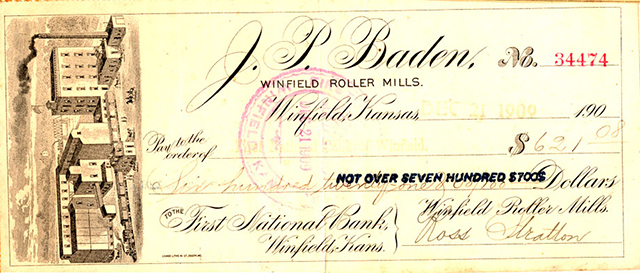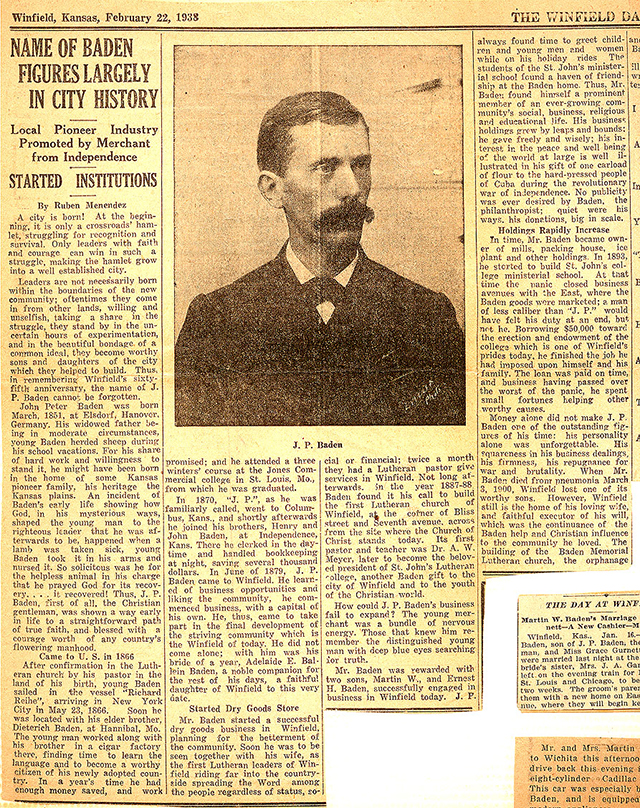








John Peter Baden Family and Descendants
from their old family scrapbook thanks to Adelaide Baden Barnard for the loan, and to Mary Ann Wortman for the typing.
scanned and formatted by Bill Bottorff
[THE GALVESTON DAILY NEWS, MONDAY, AUGUST 3, 1896.]
(Penned in at top: "See editorial other side.")
AN EXPORT COMPANY.
An Exporting House Should Be Established at Galveston.
Kansas Will Take Stock.
OUR SURPLUS PRODUCTS
--------
Could Be Held at Galveston Until Shipped.
Kansas Millers Would Send Drummers to Europe.
Winfield, Kan., Aug. 1.—To the News: The most interesting character in Kansas commercial circles is J. P. Baden of Winfield. During the last three years of hard times and general depression this man has done a business aggregating almost $2,000,000, or exceed-ing $600,000 annually, in a city whose population does not exceed 5000 people.
Mr. Baden owns and operates one of the largest and finest flour mills in the entire west and he is an advocate of the idea that a stock company should be organized with headquarters in Galveston to export the surplus product of the Kansas mills, but farther on I will give his ideas.
I want to tell the readers of The NEWS something of Mr. Baden and his unique business, for I knew him in the beginning of his career, and have watched the growth of his business with considerable interest.
Seventeen years ago Mr. Baden was a small country merchant. He conceived the idea of handling country produce and worked over the first butter he shipped in a wooden bowl. This branch of his business grew rapidly until several years since, he was counted the leading produce dealer in Kansas, and for the last eight years has occupied first rank among all wholesale produce dealers doing business between the Missouri river and the Rocky mountains.
His territory is only confined by the bounds of the United States, but he considers Texas his best field. He has customers in every city and town in the Lone Star state and to one customer has sold as high as 100,000 pounds of butter within thirty days. He does business with many Galveston houses and anticipates visiting the port within the next few weeks.
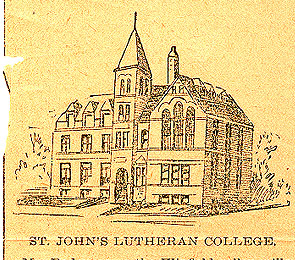
[Etching: ST. JOHN’S LUTHERAN COLLEGE.]
Mr. Baden owns the Winfield roller mills, with a daily capacity of 600 barrels. He owns the ice plant, the most elaborate and complete poultry, game, eggs and butter packing house in the west, the creamery and a great double store. It was at the latter place I met him.
"Well, Tom," he said. "I am glad to see you. I am sorry business engagements kept me away from Topeka last fall, but I have watched the work of your deep water utilization com-mittee and the progress of Galveston with great interest, and you are going to win a victory. Now tell me what you came for, tell me what you want." I replied that the most important portion of my visit was to get an insight into the wonderful business and to learn from him how Kansas millers stood toward the port of Galveston.
"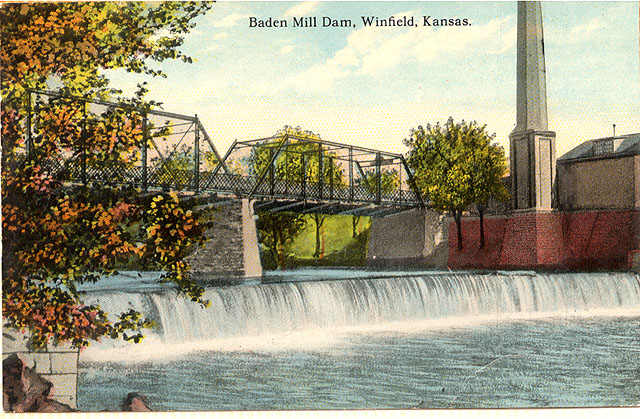
Well," he replied, "let us talk over the latter and then drive around and see the mill, packing house, creamery and ice plant. Now, this is a matter over which we should be very candid. Every miller in Kansas desires Galveston to become a great port; it is to our interest; we wish to make use of our nearest port, we want to export our surplus. At the last meeting of the Kansas state millers’ association the subject was discussed at length, and you or some-one else from Galveston should have been there. The chief worry is disposing of our surplus. Sometimes we can sell all our product, other times ten, twenty, and often a larger percentage drags. We must shorten hours or shut down and quit buying wheat. We want to run, we want to do business, we wish our machinery and labor employed. It costs as much to shut down as it does to run, and I believe with regular liners between Galveston and several European ports that to export the surplus is the solution of the problem. I am not acquainted with the export trade; I don’t know what they want, but I do know they use American flour, a great deal of Kansas flour where the millers are acquainted, and there are millions over there to feed. An exporting house or stock company of sufficient capital should be established in Galveston, I believe $100,000 would be sufficient, and let the Kansas millers take stock and pay for it in flour. I don’t think a great sum of money will be necessary; foreign houses will remit promptly. The business will certainly come, as it would pay every miller to dispose of his surplus at cost, or even a slight loss. Now, I would take stock in such a company. Let a house be established in Galveston, where the surplus for export could be stored, and if necessary the Kansas mills could and would send a representative to the several European markets."
During this talk Mr. Baden was repeatedly disturbed. He received telegraphic reports from the Chicago grain market, shook his head as he read and said, "No one can figure a day ahead under existing circumstances." He sold a car of ice, bought a car of wheat, sold a car of flour, gave to an adjoining town the Chicago quotations, entertained a coal drummer, bought a load of hay, and sold a car of poultry to New York. The telephone was the avenue of most of these transactions. We got into a buggy and drove around the city. It is a beautiful place, a cleanly, well built, well kept city of superior business houses, fine homes, finer churches and great colleges and schools, and the most important railroad center, outside of Wichita, in southern Kansas.
Mr. Baden drove directly to "our" college as he expressed it (the Methodist Episcopal college is also located here). We went through the building and it is an imposing structure, built entirely of native stone.
The college would probably have carried the name of its founder had not Mrs. Baden chose to have it wear the name of her favorite apostle, therefore it is St. John’s Lutheran college. The college catalogue speaks of the subject of this sketch and his connection with its history in the following language:
"This college is an educational institution of the English Evangelical Lutheran synod of Missouri and other states. Its founder is Hon. J. P. Baden of Winfield, Kan., who, prompted by the spirit of true Christian benevolence and generosity, built this college and then, by deed, had it transferred to above Lutheran synod, of which he is a member. A thorough classical course is taught, comprising all the branches deemed indispensable to a general education. Languages are made a specialty, yet sciences receive due attention. Additional courses will be added as the synod may direct or circumstances demand. Both sexes are admitted."
No city in America is better able to appreciate a character like Mr. Baden than Galveston, for Ball, Rosenberg and Sealy have taught residents of the Island city the value of genuine philanthropy and benevolence.
Driving from the college, Mr. Baden said: "Texas eggs deserve considerable credit for the erection of that college. Something over three years ago I bought three cars of Texas eggs; they paid me a profit of $100 a car. I thought that was making money too fast, and resolved to give my home city and church this building." A smile played around the talker’s lips as he pointed out places of special interest. I asked an explanation. "Well," said Mr. Baden, "The Texas hens agreed with me that the profits were too large, and have been laying rotten eggs ever since."
We visited the mills, and they are an ideal plant, using part water and part steam power. They cost $100,000, but their builder failed and Mr. Baden bought them for considerably less than half that amount, and refused $85,000 for the mills a few months after.
The ice plant is first class in every particular, and under the charge of an expert has no break downs. The produce packing house is most interesting, and especially the work of the egg testers, who separate this food into as many as six grades, and before an egg goes into a case it is examined as thoroughly as though each egg was worth a dollar. The process is simple. The tester stands in front of a dark box in which there are two round holes. The light is centered upon the egg, and each one is separately placed in three positions before the tester decides its grade. The old plan of candling eggs, where the tester took three in each hand and rapidly passed them over the light, wont do in this establishment. The name and reputation of Baden must be sustained. The poultry and game house, as well as the creamery and cold storage rooms, are great institutions in their way, but the reading public is familiar with their construction and management.
At each place there is a skilled lieutenant, who has the confidence of his chief and is in full command of his department. J. P. Baden pays the express and railroad companies at Winfield more money than their total receipts amount to in many towns of 5000 population.
Mr. Baden is an acquaintance of the Reymershoffers, and was especially complimentary to the article recently published in The NEWS from the pen of Mr. John Reymershoffer. He is a success, and his indorsement of an enterprise is valuable. He says there are many details of the export business with which he is not familiar, but he looks at from the common sense standpoint that the Kansas mills have a surplus which their regular customers cannot use and which they can afford to sell at cost or less in order to keep the mills going. In exporting the product the mills are relieved of the fierce competition and low prices which result in forcing upon their home markets more than is needed at fair prices. They are enabled to pay good fair prices for wheat and are in better position to deal with the north and south roads leading to Galveston than are the grain shippers who cannot well get together upon mutual ground. Mr. Baden told me that this subject had been often discussed by the Kansas state millers’ association, and that each member, without exception, is favorable.
The Galveston stock company which would buy the surplus would get it at a low price. The Texas mills would be relieved from the strong competition which the Kansas mills give them in crowding the Texas trade. The future success of this exportation would devolve upon the Kansas mills, as they would soon learn the demands of the trade and be able to meet them, and possibly make the business one of profit as well as expediency. This exportation of flour would not in the least interfere with grain export, but would rather tend to increase it. Our grain is principally used by distillers. The Kansas state millers’ association now has an agent in its employ located in New England. The Kansas millers are full of energy and push. It is a foregone conclusion that this export business, now only under consideration, will become a realization, and either New Orleans or Galveston will secure it. A great deal of Kansas flour is now exported to Europe. Glasgow is an especially favorable market with Topeka mills, and it now goes via Atlantic seaports.
I believe in this enterprise, because it is backed by common sense, and I believe in it still stronger for the reason that J. P. Baden, who is both practical and successful, thinks favor-ably of it, and I have full confidence in the belief that what he says voices the sentiments of many other Kansas millers. Many Galveston business men know Mr. Baden personally and in a business way, and I do hope that in spite of hard times and too much politics, and for the best interests of Galveston, the Kansas millers and the entire west that this enterprise will not end with this letter to The News. TOM RICHARDSON.
-0-
[Source Unknown. "1912" penned in at top of article.]
John P. Baden.
By Hon. G. H. Buckman.
For the subject of my remarks, we will look across the ocean, where in 1851, in the Province of Alsdorf, Hanover, Germany, John Peter Baden was born. In 1866 the German boy, perhaps unconsciously seeing the broad promise of the future opening before him, came to America, and after a summer spent in different places, in 1879 came to Winfield, where he lived, worked and builded until his death on March 3, 1900.
It will thus be seen that Mr. Baden came to Winfield when he was twenty-eight years old. His business experience therefore had been limited, and in connection with others, had been somewhat unsatisfactory.
Facing for the first time, the great world from a business standpoint, the vision that appeared before him was not all smiles.
He could see the frowns of a strong and determined competition from strong and experienced business men who had already established themselves in the confidence of the community.
Notwithstanding this, he also found extended to him the welcome hand of a new, struggling, energetic Western village.
The west in those days more than at present believed largely in the survival of the fittest. This was known to Mr. Baden as well as to any other man of his years, but he had the true Kansas Spirit of progress, and started upon his business career with little else than strong earnest intention to build up a great business.
Realizing that whether he succeeded or failed depended almost entirely upon his own energy and business judgment. His business vocabulary did not contain the word "fail." We all know to some extent the measure of his success, how in 20 years he built up a business that was not only the wonder of this community, but was also the wonder of the state, and the name of J. P. Baden became known in every portion of this country, west of the Mississippi, where a railroad deposited flour or produce.
Right here in our midst, where others failed or barely kept even, he built up a great business which, in those days was considered a fortune, and was the foundation, which with his genius, would have grown into a colossal fortune had he been spared to push forward the enterprises he had in mind.
While we see to some extent his success, very few of us know his sacrifices and the long hours of unremitting toil necessary for the success of the undertakings in which he was engaged. As an instance of his foresight and confidence in business, I might cite the purchase of the mill property here in Winfield.
At the time of that purchase, Mr. Baden knew nothing of the milling business. He had never had any experience in that line, but that business judgment which he possessed far in excess of other men showed him there was a great field in the milling business. Success followed his efforts, and for the first time, Winfield had a place upon the map of the great milling world.
His produce business reached into every town and hamlet of the west. He bought and sold in the remote corners of the world.
I would not consume all of my time in telling of his success as a business man, because I known of no failure so great as that of the business man who uses the genius which God has given for the purpose of building up and amassing a great fortune for his own personal aggrandizement and for his own selfish interests.
Such was not the success of Mr. Baden. We see at the head of Seventh avenue a monument of the generosity of Mr. Baden. Unassisted, he built the college building known as St. John’s college in this city, and gave it to the Lutheran church. Not only that, but he contributed largely to its support during the remainder of his life, and since his death it has received much support from his estate.
He employed many men in his various enterprises. If any of his employees were sick or were injured in any way, he paid them the regular salary during the time of their sickness or during the time they were incapacitated from work by reason of an accident. If the accident occurred at the mill or other place of business controlled by him, he paid all doctors’ bills, and nurses, and for the support and comfort of the unfortunate person.
These things were perhaps unknown to anyone outside of those receiving the benefits, and his own immediate family.
Not many years ago I had occasion to spend the summer in one of the remote mountain valleys in Colorado. The valley was sparsely settled by people who had lived there a great many years; in talking with them, they found I was from Winfield, Kansas. They asked if I knew J. P. Baden. I told them I knew him well, and asked what they knew of him. They told me that for years up until his death, he had been in the habit of contributing not only of money but of goods of all kinds to their pastor, and to the needy members of their church at that place.
None outside ever heard of that circumstance from the lips of Mr. Baden or from any one connected with him, and it would probably never have been known to this community, except for the accident of that summer’s visit.
I believe Mr. Baden was possessed of a vision as great if not greater than any man in our community. There was no public enterprise which seemed for the good of the public generally, but what received his full and earnest support.
He believed in mankind, he loved his fellow men, and was ready to lift up the unfor-tunate, not by extending an empty hand, but by extending to them a hand filled with good cheer.
Mr. Baden was essentially a religious man and belonged from an early age to the Lutheran church, and during the early stages of that church in Winfield, he paid all of the expenses of the pastor and the services were held in one of the rooms in his home; and later when the congregation grew and a little church building was built, Mr. Baden and his family were always regular attendants at service.
He often remarked that the happiest moments of his life were spent in that little church where he could dismiss all thoughts of business.
I have no doubt, if he could speak, he would say the most fitting monument that could be erected to his memory is the church of his beloved denomination standing on Seventh avenue in this city, and erected to his memory.
These men will have lived in vain if we draw no less from their lives; let us then in love and unity push forward to the goal for which these men were struggling.
THE BOOSTER
St. John’s E. L. College, Winfield, Kansas, April, 1923.
Volume II. Number 4.
"Entered as second-class matter, Oct. 1, 1922, at the post office at Winfield, Kans., under the act of Aug. 24, 1912."
STAND BY ST. JOHN’S
If you think St. John’s the best,
Tell ’em so!
If you’d have it lead the rest,
Help it grow.
When there’s anything to do,
Let the others count on you,
You’ll feel bully when it’s thru;
Don’t you know.
When a stranger from afar
Comes along,
Tell him who and what we are—
Make it strong.
Needn’t flatter, never bluff,
Tell the truth, for that’s enough;
Join the boosters—they’re the stuff.
We belong.
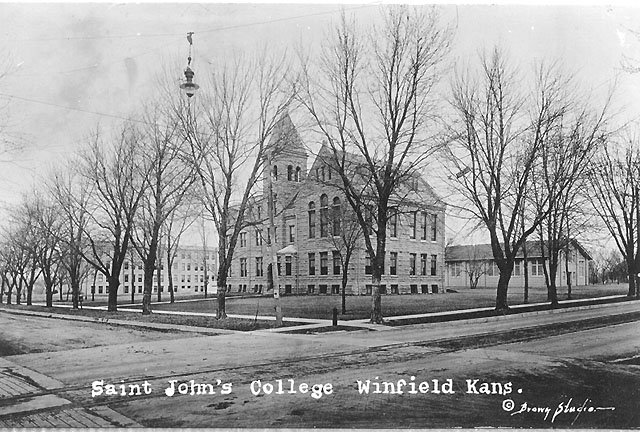
A View of the College Buildings from the South-East.
The building in the forefront is the historic Baden Hall, at present used for recitation and library purposes. To the left you see the fireproof boys’ dormitory, which must accommodate over 150 boys. Our gymnasium you see to the right. All buildings are erected of stone; they present a substantial appearance, and are in good condition. The athletic field is immediately across the street, east, and not shown on this view.
[Photograph with Caption.]
J. P. BADEN
Founder of St. John’s
Historic Sketch
St. John’s College, as an institution, has just completed the thirtieth year of its activity and usefulness, and it seems appropriate that a brief survey of its history be given.
Usually a church institution owes its origin to an action of Synod, which implies a careful selection of location, provisions for the necessary funds, and an assurance of patronage. However, St. John’s College was built by one man, the sainted Mr. J. P. Baden, who bought the building site, one block of ground for $1200.00, and erected the massive stone building now known as the Baden Hall, contributing for erection and support of the institution fully $50,000.00.
On February 20, 1893, incorporation papers were signed by J. P. Baden, C. L. Janzow, Silas Rader, J. G. Moeckel, and G. Luecke. The first Trustees were: J. P. Baden, C. L. Janzow, A. W. Meyer, D. N. Wolf, and Silas Rader. Architect F. May, of St. Louis, was the designer of the building, and Mr. E. Klauser, of Winfield, the contractor and builder. On May 10, ground was broken by Mrs. J. P. Baden, and in the same month the property was presented to the English E. L. Synod, then in session in Chicago, and thankfully accepted.
The building, naturally, was not ready for occupancy by September following, but classes were opened in temporary quarters in town, under Prof. H. Steoppelwerth, assisted by Pastor G. Luecke.
On March 1, 1894, Baden Hall was solemnly dedicated, on which occasion the first College President, Prof. H. Sieck, was the main speaker. Owing to failing health, he resigned the year following, and accepted a call to Milwaukee, Wis. A. W. Meyer, of Pittsburgh, Pa., succeeded him.
The Faculty by this time consisted of four synodical teachers, Profs. C. Scaer and L. Steiner, of the Tri-State Normal College, Angola, Ind., having been secured.
In the year 1898, the first four ministerial graduates were given their diplomas for the St. Louis Seminary. We give their names: Emil Biegener, John Bopp, Hy Borcherding, and Walter Cook.
On March 3, 1900, Mr. J. P. Baden, the founder and main supporter of the institution, was called to his eternal home succumbing to pneumonia, and the small English Synod, finding the adequate support of the college (having, besides, another one at Conover, N. C.,) too great a burden, offered the institution to the Delegate Synod (the general synodical body), when in session in 1908 at Ft. Wayne, Ind. The offer was accepted. In 1910, Prof. M. Graebner, of Oklahoma City, Okla, was called as fifth professor.
It should be inserted that St. John’s was co-educational from the time it opened its doors to students. A commercial department was also an early feature. This School of Business has grown with the institution, and now ranks with the first of its class. Prof. I. J. Kloster has been at its head for upward of fifteen years.
Because of the utter impossibility of accommodating the increasing number of students in the Baden Hall, Synod, in 1914, when in session in Chicago, authorized the erection of our present fireproof boys’ dormitory, built of native stone, sanitary and modern in every respect, and ranking with the best in Kansas.
Prof. J. W. Werling assumed his duties as an additional regular Professor in March 1918, having been called to the chair of German language and literature; and in September, 1920, Prof. A. E. Kunzmann, of the Lutheran College, Greensboro, N. C., was installed as professor of natural sciences.
THE WINFIELD DAILY COURIER, Winfield, Kansas, February 22, 1938.
[PICTURE OF J. P. BADEN INSERTED IN ARTICLE THAT FOLLOWS.]
NAME OF BADEN FIGURES LARGELY IN CITY HISTORY
Local Pioneer Industry Promoted by Merchant from Independence
STARTED INSTITUTIONS.
By Ruben Menendez.
A city is born! At the beginning, it is only a crossroads’ hamlet, struggling for recognition and survival. Only leaders with faith and courage can win in such a struggle, making the hamlet grow into a well established city.
Leaders are not necessarily born within the boundaries of the new community; oftentimes they come in from other lands, willing and unselfish, taking a share in the struggle; they stand by in the uncertain hours of experimentation, and in the beautiful bondage of a com-mon ideal, they become worthy sons and daughters of the city which they helped to build. Thus, in remembering Winfield’s sixty-fifth anniversary, the name of J. P. Baden cannot be forgotten.
John Peter Baden was born March, 1851, at Elsdorf, Hanover, Germany. His widowed father being in moderate circumstances, young Baden herded sheep during his school vacations. For his share of hard work and willingness to stand it, he might have been born in the home of some Kansas pioneer family, his heritage the Kansas plains. An incident of Baden’s early life showing how God, in his mysterious ways, shaped the young man to the righteous leader that he was afterwards to be, happened when a lamb was taken sick. Young Baden took it in his arms and nursed it. So solicitous was he for the helpless animal in his charge that he prayed God for its recovery. . . . it recovered! Thus, J. P. Baden, first of all, the Christian gentleman, was shown a way early in life to a straightforward path of true faith, and blessed with a courage worthy of any country’s flowering manhood.
Came to U. S. In 1866
After confirmation in the Lutheran church by his pastor in the land of his birth, young Baden sailed in the vessel "Richard Reihe," arriving in New York City in May 23, 1866. Soon he was located with his elder brother, Dieterich Baden, at Hannibal, Mo. The young man worked along with his brother in a cigar factory there, finding time to learn the language and to become a worthy citizen of his newly adopted country. In a year’s time he had enough money saved, and work promised; and he attended a three winters’ course at the Jones Commercial college in St. Louis, Mo., from which he was graduated.
In 1870, "J. P.", as he was familiarly called, went to Columbus, Kans., and shortly afterwards he joined his brothers, Henry and John Baden, at Independence, Kans. There he clerked in the daytime and handled bookkeeping at night, saving several thousand dollars. In June of 1879, J. P. Baden came to Winfield. He learned of business opportunities and liking the community, he commenced business, with a capital of his own. He, thus, came to take part in the final development of the striving community which is the Winfield of today. He did not come alone; with him was his bride of a year, Adelaide E. Ballein Baden, a noble companion for the rest of his days, a faithful daughter of Winfield to this very date.
Started Dry Goods Store
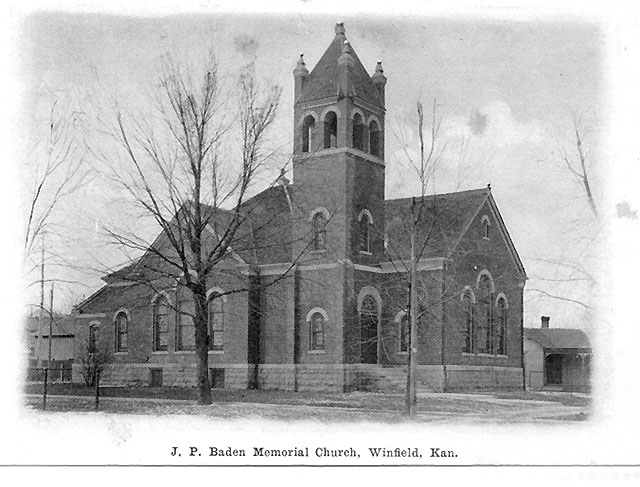
Mr. Baden started a successful dry goods business in Winfield, planning for the betterment of the community. Soon he was to be seen together with his wife, as the first Lutheran leaders of Winfield riding far into the countryside spreading the Word among the people regardless of status, social or financial; twice a month they had a Lutheran pastor give services in Winfield. Not long afterwards, in the year 1887-88, Baden found it his call to build the first Lutheran church of Winfield, at the corner of Bliss street and Seventh avenue, across from the site where the Church of Christ stands today. Its first pastor and teacher was Dr. A. W. Meyer, later to become the beloved president of St. John’s Lutheran college, another Baden gift to the city of Winfield and to the youth of the Christian world.
How could J. P. Baden’s business fail to expand? The young merchant was a bundle of nervous energy. Those that knew him remember the distinguished young man with deep blue eyes searching for truth.
Mr. Baden was rewarded with two sons, Martin W., and Ernest H. Baden, successfully engaged in business in Winfield today. J. P. always found time to greet children and young men and women while on his holiday rides. The students of the St. John’s ministerial school found a haven of friendship at the Baden home. Thus, Mr. Baden found himself a prominent member of an ever-growing community’s social, business, religious and educational life. His business holdings grew by leaps and bounds; he gave freely and wisely; his interest in the peace and well being of the world at large is well illustrated in his gift of one carload of flour to the hard-pressed people of Cuba during the revolutionary war of independence. No publicity was ever desired by Baden, the philanthropist; quiet were his ways, his donations, big in scale.
Holdings Rapidly Increase
In time, Mr. Baden became owner of mills, packing house, ice plant and other holdings. In 1893, he started to build St. John’s college ministerial school. At that time the panic closed business avenues with the East, where the Baden goods were marketed; a man of less caliber than ‘J. P." would have felt his duty at an end, but not he. Borrowing $50,000 toward the erection and endowment of the college which is one of Winfield’s prides today, he finished the job he had imposed upon himself and his family. The loan was paid on time, and business having passed over the worst of the panic, he spent small fortunes helping other worthy causes.
Money alone did not make J. P. Baden one of the outstanding figures of his time; his personality alone was unforgettable. His squareness in his business dealings, his firmness, his repugnance for war and brutality. When Mr. Baden died from pneumonia March 3, 1900, Winfield lost one of its worthy sons. However, Winfield still is the home of his loving wife, and faithful executor of his will, which was the continuance of the Baden help and Christian influence to the community he loved. The building of the Baden Memorial Lutheran church, the orphanage and many other works show the Badens’ upbuilding of this city.
J. P. Baden, the man, is well illustrated in the following poem written in his memory shortly after his death:
The Old Man
I covet not kingdoms, or riches of earth,
Mere phantoms of life’s little span,
And yet there’s a station I long to attain:
I’d like to be called "The Old Man."
In Army, or office, or college, or mill,
Where men render homage to worth,
You’ll find "The Old Man" is a nobler degree
Then titles of favor or birth.
"The Boss" is a master who drives with a lash;
"The Governor" rather a guy;
But labor laughs loud where they say "The Old Man,"
And hushes the workingman’s sigh.
He is patient of error, exacting of truth,
Rebukes if he must with a smile;
A brother in sorrow, and "one of the boys,"
But still "The Old Man" all the while.
The day he is absent the shop is awry,
Though the "sub" does the best that he can,
And when he returns they pray as the work:
"God bless and preserve ‘The Old Man.’"
THE ST. JOHN’S REPORTER, Tuesday, May 16, 1967.
A Biography of John Peter Baden
By Dr. C. S. Mundlinger
BEFORE THE BEGINNING
Editorial note: This is part four of a serialization of the life of John Peter Baden, the founder of St. John’s College.
Baden’s Business Methods
Just why was Mr. Baden financially so successful? What were his business methods?
Let me say at the outset that Mr. Baden was a keen, shrewd man. His fellow townsmen described him as a "human dynamo." he was, as we would say today, sharp.
He took many calculated risks. However, he calculated the risks very carefully before he took them. He had a quick, probing mind. He could see relationships, and he had a very strong imagination.
People who did not know the methods of the business world thought at times that he was a senseless plunger.
His banker, Mr. W. C. Robinson of the First National Bank, had strong misgivings when Mr. Baden stepped into the bank one morning and asked for a loan of $20,000. It was in the depth of the Cleveland Depression. But Mr. Robinson finally agreed to make the loan just because Mr. Baden said it was a good loan.
The confidence which people had in his extremely shrewd judgment and the fact that he never failed to give people 100 cents on the dollar were perhaps the greatest assets he had in his business operations.
In managing his enterprises, he placed an intelligent and responsible person at the head, but he himself made the final decision on matters of major concern. His mind was always working on business. During the interview with Tom Richardson of the Galveston News, Mr. Baden was simultaneously answering Mr. Richardson’s questions and conducting the affairs of business. Richard describes it this way:
"During this talk, Mr. Baden was repeatedly disturbed. He received telegraphic reports from the Chicago grain markets, shook his head and said, ‘No one can figure a day ahead under existing circumstances.’ He sold a car of ice, bought a car of wheat, sold a car of flour, gave to a grain dealer in a nearby village the Chicago quotations, entertained a coal drummer, bought a load of hay, and sold a car of poultry to a house in New York. The telephone was the means of communication for most of these transactions."
The story is told by an acquaintance of Mr. Baden’s, who knew him well, that he had two ponies. One he would use in the forenoon and one in the afternoon. A boy always stayed with the horses so that he could take Mr. Baden to his various places of business just as quickly as he could get him there.
When telephone service was made available in Winfield, in the 1880s, Mr. Baden was among the first to subscribe for this new service. In 1890 the Winfield Courier listed the names of the residents owning the fifty telephones then in use. Mr. Baden was the only person having two.
Mr. Baden did not on occasion hesitate to take risks in carrying on business transactions. For example, he shipped a carload of produce to Chicago at the bottom of the Cleveland Depression. When no one would buy it in Chicago, he immediately telegraphed the railroad company to route the car to New York, even though he had no contract with any New York firm for the shipment. Through New York contacts the produce was sold—at a profit of $1,000 more than he expected to make in Chicago.
Mr. Baden was by no stretch of the imagination a miser. He did not carry on business merely to accumulate wealth. Strange as it may seem in fact, he never had much money readily available. He did business largely with borrowed capital. He did not believe in saving money just so a person could say that he had it, but he did believe strongly that money could be used to bring blessings to mankind. He looked upon money, and especially on credit, as instruments for doing things.
Mr. Martin Jarvis, Sr., told this writer that in 1899, he, Jarvis, was a young clerk in the First National Bank and that it was his job to go to Mr. Baden’s establishment each morning to conduct a sort of one-man clearing house with Mr. Baden.
If Mr. Baden had an overdraft at the bank, which he often had, Mr. Jarvis was instructed to accept Mr. Baden’s note to cover the amount. If he had a balance, Mr. Jarvis informed Mr. Baden of the amount so that business could go on without delay.
Buys Mercantile Establishment
On August 7, 1879, Mr. Baden traveled east to buy new stock. Since the railroad was not completed, he traveled by stage-coach. He returned from his eastern trip with "piles and piles of new goods," which filled his large storeroom to overflowing. (3)
The editor of the Courier said on February 5, 1880, "We dropped into Baden’s Tuesday and found that gentleman with a corps of assistants putting away a recent invoice of groceries just received. This is rather late in the season for new goods, but Baden keeps ordering every day. All he wants is plenty of customers and he furnishes the goods and low prices." (4)
His idea of going directly to the wholesaler, and not depending on a "drummer" to come by, was motivated by his concern to know his suppliers personally and that they know him personally. In this way, Baden established credit with the wholesale houses.
Credit was done on a more personal and informal basis at that time. He wanted to make himself acquainted with the wholesalers and demonstrate to them the kind of person he was. Personality had a lot to say in Mr. Baden’s philosophy.
His success was nothing less than phenomenal. Merchandise came into this store everyday and he moved them out almost as fast as they came in. He caught the big idea of small profits and big volume.
Everything on which he laid his hands seemed to flourish and yield him rich returns. His fertile young brain was active all during his waking hours.
From his advertising in the Winfield Courier—and he was a strong believer in printer’s ink, using it almost continuously in his business—we learn that he always placed great stress on the name BADEN.
He would place a quarter page advertisement in the paper. Across the top, emblazoned in bold black letters was the name B A D E N. Then he would list the items he wished to emphasize in the sale, and below he would again sign, "J. P. Baden."
He was a great believer in the value of a name. All through his advertising the thing that often strikes us is how carefully he used his name. He wanted his name before the readers of the Winfield Courier.
Wild Game & Poultry Business
While he was engaged in the mercantile and the grocery business, he was constantly busy buying wild game and poultry. He seems to have had a predilection for this part of the business. He even went so far as to buy guns and shells for the young men of Winfield who would go out and shoot prairie chickens.
They literally brought in wagon loads of prairie chickens and then he would pay them for the game, less the cost of shells. He sent carloads of poultry and wild game from Winfield to the Chicago and New York markets. This was right after he started the mercantile business and before he had the packing house.
Small Profits—Rapid Turnover
In studying the various transactions of Mr. Baden, one is impressed by the care which he exercised in computing profits. He was careful not to make too large a profit on any one transaction, but many transactions with a small profit on each one.
In the interview which Mr. Tom Richardson had with Mr. Baden, Mr. Baden said in the course of the conversation about St. John’s College:
"Texas eggs deserve a good deal of credit for that college. Something over three years ago I bought three carloads of Texas eggs; they paid me a profit of $1,000 per car. I thought that was making money too fast and resolved to give my home, my city, and my church this building."
A smile played around the talker’s lips as he pointed out places of special interest. I asked an explanation. "Well," said Mr. Baden, "the Texas hens agreed with me that the profits were too large and have been laying rotten eggs ever since." (5)
Packing House
The selling of poultry, wild game, butter and eggs was really a sideshow in contrast to his big mercantile interests, but this soon led up to some of the biggest developments in Mr. Baden’s economic life.
It didn’t take very long until he built a huge cold storage plant, together with an ice plant. There were really two businesses that worked together. The packing house was one business and received its whole complement of refrigeration from the ice plant.
A reporter for the Galveston Texas News, Tom Richardson by name, interviewed Mr. Baden on August 13, 1896. He described Mr. Baden thus:
"The most interesting character in Kansas Commercial circles. During the last three years of hard times (Cleveland Depression) he has done a business aggregating almost $2,000,000 in a city whose population does not exceed 5,000 people." (6)
It was looked after personally by Mr. Baden, though he entrusted a great deal of the supervision of the business to trustworthy foremen. Mr. Baden had a keen eye for under-standing people. He could almost look through people and see what was in them. He was quick to spot any hidden talent in men.
The packing house was a huge building, 254 feet by 80 feet. (7) It had a cold storage capacity of about twenty-two cars. The ice house had a capacity of 1,200 tons. One of the first customers of the ice house was the Frisco Railroad. It bought a whole trainload of ice as its first consignment.
By March 1892, four carloads of eggs were being shipped every week from the packing house. Four carloads meant 48,000 dozen. This represented $10,000 a week.
The butter capacity of the packing house was 14,000 pounds a day. During the summer months, Baden shipped better than 10,000 pounds of butter a day.
In addition, he shipped an average of one car of produce a day, or a yearly shipment of over 300 cars from the packing house alone.
The produce output for 1896 reached the enormous figure of 840,700 pounds of butter; 57,586 cases or 1,727,160 dozen of eggs; and 592,121 pounds of poultry. The business was constantly growing.
Receipts of the first three months of 1897, for eggs alone, amounted to 37,227 cases. He paid out to his help very close to $2,500 per month while the money paid his suppliers for the products amounted to $74,500 per month. (8)
-0-
[NEWSPAPER CLIPPING. SOURCE & DATE UNKNOWN.]
And now comes J. P. Baden, the conductor of the big dry goods and grocery house and game depot and deposes and says that it’s a boy, about ten pounds and exceedingly handsome. We believe all he says and will smoke at his expense at our earliest convenience.
St. John’s College Mirror.
Memorial Edition.
APRIL 1, 1900.
[PHOTOGRAPH. MR. J. P. BADEN.]
VOLUME I. NUMBER 8
DEMISE OF MR. JOHN PETER BADEN
Founder of St. John’s College and Chairman of Board of Trustees.
 Our college is in mourning, its founder and patron having been called hence. After barely a week’s illness with pneumonia, Bro. J. P. Baden died in the Lord, as we confidently hope, on Saturday evening March 3d. A deep concern was shown in his illness, not limited to any class of people. The members of the St. Martin’s church assembled for special prayer meeting when the brother’s illness took a serious turn. We prayed for his life and God granted it—giving him life eternal. For details of the funeral exercises and of the high estimation in which the deceased was held by the public at large, we refer to the report of the Winfield Daily Courier appended.
Our college is in mourning, its founder and patron having been called hence. After barely a week’s illness with pneumonia, Bro. J. P. Baden died in the Lord, as we confidently hope, on Saturday evening March 3d. A deep concern was shown in his illness, not limited to any class of people. The members of the St. Martin’s church assembled for special prayer meeting when the brother’s illness took a serious turn. We prayed for his life and God granted it—giving him life eternal. For details of the funeral exercises and of the high estimation in which the deceased was held by the public at large, we refer to the report of the Winfield Daily Courier appended.
"The funeral of J. P. Baden occurred yesterday afternoon, the exercises taking place at St. John’s college chapel and there may never be another such a funeral in Winfield. Business was suspended, district court adjourned and the public schools closed for the afternoon, out of respect for the illustrious dead. The entire community, for whom the lamented dead had done so much, was anxious to pay a last sad tribute to his memory and the college chapel did not hold one-tenth of the people.
"Private exercises were held at the residence at 2 o’clock and the public exercises at 2:30. Immediately after noon, people began to assemble and long before the time for the arrival of the funeral cortege, the building was full to overflowing and the sidewalks were blocked. Mr. Baden’s employees at his various institutions formed in open order, facing in, on each side of the walk leading to the college, having met at the ice plant and marched to the college in a body. The city council, headed by Mayor Albright, and the Commercial club, headed by President Hahn, attended and prominent business men from various towns around were here to honor the memory of the man whose genius and integrity won the admiration of the business world beyond the borders of his own state.
The floral offerings were large and unusually beautiful. Over the rostrum hung a picture of the deceased draped in mourning and on each side were banks of flowers arranged in magnificent designs making a picture indicative more of the resurrection than of death, and their fragrance sweetened the air giving a feeling of hope, faith and peace. Among the most elaborate and handsome offerings was that of Judge Geo. W. Sanderson, E. F. Nelson and I. W. Randall, the survivors of the quintet who used to celebrate their anniversaries on the same date, March 24, Mrs. J. B. Lynn being the other member. Had they all lived to the anniversary this year Mrs. Lynn and Judge Sanderson would have been 53 years old, Mr. Randall 50 and Mr. Baden and Nelson 49.
"The exercises were solemn and impressive, yet sweetly solacing to those who mourned him most. Rev. H. Rauh, pastor of the Lutheran church of which the deceased was a member, had charge of the exercises and he made a short address full of hope and comfort to the family and friends of the deceased. Rev. Martin Sommers of St. Louis, an old friend of the family, made the principal address and he paid an eloquent tribute to the memory of the dead. He spoke of his early troubles and of his triumphant victory over every obstacle. At the confirmation he had been given the twenty-third Psalm and had made it his life motto. To him the language, ‘The Lord is my shepherd, I shall not want,’ had been an ever present help and a shield from discouragement. His success in life had demonstrated the strength of character possible only to those who relied on God for support and guidance. He spoke to the widow in words of comfort and told her of the honor conferred upon her by God in granting her the privilege of being to this man a companion, helpmeet and counselor whose sympathy and advice was a source of constant help to him in his contact with men. He told her she was not as one without hope and spoke of the reunion beyond this life as the fulfillment of the promises of God. He reminded the two sons of the priceless heritage of an honored name and pleaded with them to always remember they were the sons of their father. He told them in the years to come when better acquainted with men they would realize more and appreciate better the kind of a father he had been to them. To the community at large he advised thankfulness for the blessings conferred rather than sorrow for their great loss.
"Rev. Luessenhop, pastor of the Lutheran church at Independence, then delivered an address in German.
"A few remarks by Rev. A. W. Meyer, president of St. John’s college, closed the exercises. He spoke briefly of the noble nature of the man whose philanthropy had been in extent commensurate with his genius in the commercial world. He spoke of the debt of gratitude due to his memory by the people of Winfield, and urged the emulation of his noble deeds. Music by the congregation and a male quartet was interspersed, and after benediction by Rev. Rauh, the casket was opened that the assembled friends might look for the last time on the face of him they had assembled to honor. It was almost an hour before the last mourner took a last long lingering look at the well known features, and then the casket was closed and the face of J. P. Baden was hidden from the world forever.
"A large crowd followed the remains to the grave, where after the usual exercises the body was consigned to the tomb its mission done, its journey ended.
"The pall bearers were Victor Auhage, Will Schurman, Henry Schurman, Fred and Frank Ballein, and Chance Wells. Besides prominent visitors from other towns, the following relatives and friends were here from Independence: Mr. and Mrs. Henry Baden, Mr. and Mrs. Jno. Baden, Jr., Mrs. Dittmer, Jno. Dittmer, Henry Dittmer, D. Baden, Mrs. Biederman, Miss Kate Baden, Miss Anna Baden, Mrs. Jno. Baden, Will Baden, Fred Baden and Rev. Luessenhop.
OBITUARY.
"J. P. Baden was born in Hanover, Germany, March 24, 1851, his mother dying when he was two days old. His father was a farmer in very moderate circumstances and at the tender age of 7 years he was put to work herding sheep in the summer time. When 15 years old he with his brothers came to America, stopping first at Alton, Ill. He there went into a tobacco factory and cut tobacco, later making cigars. He worked by the piece, and by working from as early as 5 o’clock in the morning to midnight he was enabled to earn as much as $25 per week. He at first attended public school in the winter, working during the summer and saving his money which he used later to pay his way through Jones Commercial college at St. Louis, where, after several seasons, he received his diploma.
"His first adventure in business was at Columbus, Kansas, where he opened a small confectionery, but that venture not proving the success he desired, he went to Independence to work for his brothers. He clerked in the day time and handled game at night, in that way saving $5,000, with which he commenced business in Winfield in 1879.
"His career in Winfield has been phenomenally successful. His every venture proved successful and everything he touched made him money. His fertile brain early saw the possibilities of the produce business in this country and the development of that idea has made Winfield the most widely known in the commercial world probably of any city of its size in the United States. He enlarged his store here until when he sold it to Brady Bros., a few years ago, it was one of the largest stores in Winfield. Since then he has devoted his entire attention to his mill, one of the biggest and best in the state, his ice plant and cold storage the largest plant west of St. Louis, and his produce business.
"Mr. Baden possessed the talent of making money to a remarkable degree but he never prostituted the talent to the sordid love of money. He enjoyed making money, but it was the love of others that prompted him to action. His life was a model of simplicity and pomp and splendor as a vulgar display of wealth was antagonistic to his nature. He managed his accumulations as a steward and he realized the responsibility of the sacred trust. Every dollar he controlled was kept constantly in the channels of trade, stimulating business and giving work to the unemployed.
"His benefactions amounted to several small fortunes and the extent of his charities was not realized or appreciated until his death. He practically built, and for several years maintained, St. John’s college and the Lutheran church. He lived to see the college become one of the two colleges in the United States supported by the general synod, thus assuring its permanency. He was one of the originators of the Chautauqua assembly and remained an active member of the executive committee to his death. He was a prime factor in the erection of the observatory, and one of the most active members of the hospital association. These are only a few prominent instances of his generosity but they serve to show his public spirited nature. When the appeal was made for the Cubans, he was the first to respond and he donated 10,000 pounds of flour. This was in harmony with his whole life, he did everything on a big scale, his mind could not conceive of any other way. Deserving charity never appealed to him in vain and although he performed an enormous amount of work he was never too busy to listen to a call for help. The community has not yet fully realized the extent of the loss sustained by his death.
"January 15, 1878, he was united in marriage to Miss Adelaide E. Ballein, who has been to him a true and noble wife. He was domestic in his nature and prized his home and family and the seclusion it afforded, above everything else. It was the highest ambition of her whom he loved to honor, to make his home a haven from the strife he encountered in the world outside. Two sons blessed this union, Martin W., now 21 years old, and Ernest H., 18 years old. His greatest pride rested in his boys, and it was his ambition to live to see them reach man’s estate and become active, useful members of society. Besides his immediate family, he leaves a brother and a sister to mourn his loss."
Wedding Announcement:
Mr. & Mrs. F. Schürmann
Request the pleasure of your company at the Marriage of their Daughter, on Tuesday, January 15, 1878, at 10 A. M., At their residence in Neosho.
Peter Baden. INDEPENDENCE, KAN.
[NEWSPAPER CLIPPING/SOURCE UNKNOWN. Someone penned "1878"]
Married.
At the residence of the bride’s father, Mr. F. Schurmann, at 10 o’clock A. M., on the 15th inst., Mr. PETER BADEN, of Independence, Kas., to Miss ADELINE E. BALLEIN, of this city, by Rev. Henry Grupe.
After partaking a splendid dinner, the happy couple were accompanied by a number of the bride’s friends to the depot, where she bade them an affectionate adieu, and boarded the west-bound train for her future elegant home in Independence. Mr. Baden is one of the first merchants of Independence, a gentleman in the most exalted sense of that term. Mr. Baden has gained a prize more precious than the gold of Ophir, and one who, no doubt, will preside over his mansion with queenly ability. The young folks of our city regret very much having to give up so estimable a young lady as Miss Addie, and some of our young men have been seized with a very violent species of catalepsy, since they have realized that a Kansas grass-hopper has plucked one of the fairest flowers of our fair-sex-blooming city. The bride has the wishes of a host of friends for her perennial marital felicity, in which the members of THE TIMES join, with bows of grateful acknowledgments for her kindly and appreciable remembrance.
MRS. J. P. BADEN.
[THE WINFIELD DAILY COURIER/DATE UNKNOWN.]
BELOVED CITIZEN DIES; LIVED LIFE OF INSPIRATION.
Mrs. J. P. Baden Passes in Winfield Hospital; Funeral Thursday.
Mrs. J. P. Baden, revered resident of Winfield for many years and one of the leading women of this community, died at Newton Memorial hospital at 9:55 a.m. today. She was 80 years old.
For a time Monday it seemed that perhaps Mrs. Baden might recover from the effects of the serious attack which seized her during the night Saturday but shortly before noon Monday she suffered a second stroke from which she never regained consciousness. The end came without suffering while she slept.
Service at Lutheran Church.
Funeral services for Mrs. Baden will be conducted from the Baden Memorial Lutheran church at 3 p.m., Thursday. Burial will be in Union cemetery where her late husband was buried in 1900. The Rev. Werner Kuntz, pastor of the church, will officiate. The service will be conducted in accordance with Mrs. Baden’s expressed wishes in a letter she left 10 years ago with her son, Martin, to be opened at her death. She also requested that no flowers be sent to her funeral.
Mrs. Baden was one of the strongest characters this community has ever produced. Hers was a familiar figure as she went quietly about her business, her mind alert to the last and intent on doing the greatest good possible. Her interests were those of her church, her family and her community and she worked untiringly to accomplish the purposes she believed best. Few knew of her charities for she worked through friends to serve some of them and to keep anonymous her own participation.
Helped to Form Church.
As a young woman, Mrs. Baden came to Winfield with her husband from Independence, Kans. As Adelaide Elisabeth Ballein, she was born at Alexandria, Clark county, Missouri, on July 12, 1861. Her parents moved to Neosho, Missouri, in 1870, and there she was educated in the public schools. At Neosho, on Jan. 15, 1878, she was married to J. P. Baden and with him came from Independence to Winfield before the railroad was built here. Two sons, Martin W. and Ernest H., were born to this union. Both of them reside in Winfield.
In the summer of 1880, Mrs. Baden united with the Lutheran church and in that faith she remained steadfast to the end. With her husband she helped organize the local Lutheran congregation and establish a church. She had helped to build the first church here and recently had commented that she hoped to be able to join in the sixtieth anniversary celebra-tion of that congregation. Her aspirations toward that end were not achieved for the anniversary will not occur until March of this year.
Aside from her countless charities to individuals, many of whom never knew their benefactor, Mrs. Baden’s special interests were those of her church. One evening in 1892 when he had had an unusually successful day at his office, her husband discussed with her the possibility of the two of them doing something for the community and the church as an expression of appreciation for their blessings. From that evening’s talk together, St. John’s college resulted for the following year, in the depth of the Cleveland depression. Mr. and Mrs. Baden made a contribution of $50,000 to the Lutheran church for the purpose of starting in Winfield a college to which both girls and boys might have access. Until 1938, it was the only Lutheran co-educational college in existence.
Helped Organize Hospital.
Mrs. Baden interested herself in the health of the community and was one of the handful of persons who pioneered here by incorporating the institution which later became St. Mary’s hospital.
When her beloved husband died March 3, 1900, Mrs. Baden built and equipped, even to pipe organ and pews, a new Lutheran edifice. It bears the name of Baden Memorial Lutheran church. Later as the good of St. John’s college began to multiply in terms of students, she and her sons and members of the John and Henry Baden families of Independence provided a pipe organ for St. John’s college in the new administration building as a further memorial to J. P. Baden. More recently still, she purchased and gave to the college a residential property to be used as a girls’ dormitory.
In tribute to Mrs. Baden, flags at St. John’s college today were lowered to half mast and will remain there until after her funeral on Thursday.
Largely through the efforts of Mrs. Baden, the Lutheran orphanage was moved to Winfield from Topeka in 1907. She provided the first building for it and throughout the years in many ways manifested her interest in the institution and the boys and girls who were wards of the home.
Was Good Citizen.
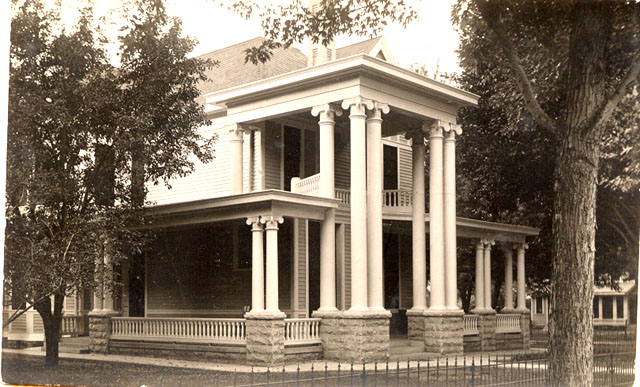
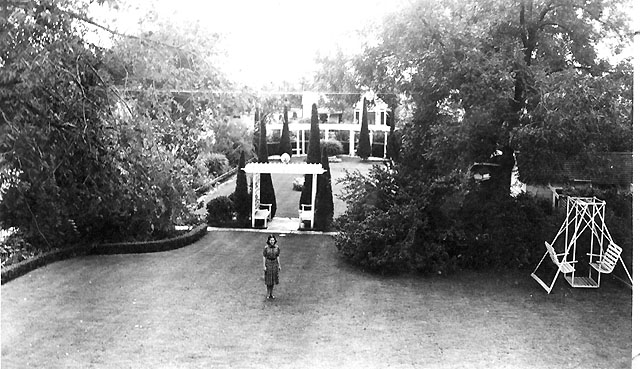
Mrs. Baden’s gifts to her church and the community were not those of money alone. She was a stalwart figure who served as a shining example of good citizenship. With little assis-tance she kept her own home until the day of her fatal illness. For 57 years she had occupied the same home at 1203 east Ninth avenue. She worked in her garden, fed the birds winter and summer, became friends with passersby and to the end kept in close touch with her countless friends and acquaintances. She organized and at her death was president of the Cowley County Historical society.
Survivors of Mrs. Baden include her two sons and her granddaughter, Adelaide Baden of Winfield, and three brothers—Frank Ballein of Winfield, Henry F. Schurmann of San Antonio, Texas, and W. A. Schurmann of Griffith, Ind. H. F. Schurmann arrived in Winfield about noon Monday but W. A. Schurmann will be unable to come as his wife is seriously ill.
MRS. J. P. BADEN.
SHE SERVED LONG AND WELL.
[Newspaper Source/Date Not Given.]
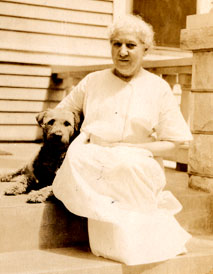 Winfield lost one of her most useful citizens yesterday when Mrs. J. P. Baden left this world for a better one. She had treasures in heaven. Left a widow with two young sons at the age of thirty-nine, and with a modest fortune, she carried on courageously. Her husband’s plans for a Lutheran college in Winfield had found support from her while he was living. From the time she was left alone until her life ended she fostered and encouraged St. John’s college, giving of her means to help it live and grow. Mrs. Baden was no clinging vine. She was a sturdy oak. She lived modestly herself that she might be generous in giving to the enterprises and causes in which she was interested. Her benefactions were many. Most of the gifts were so quietly made that few knew about them. A crippled child brought not only sympathy but action. Mercy hospital in Kansas City was on her list, its work encouraged by gifts from time to time as her means permitted. Civic drives usually found her ready to give, although if the cause did not seem worthy she could say no with quiet dignity.
Winfield lost one of her most useful citizens yesterday when Mrs. J. P. Baden left this world for a better one. She had treasures in heaven. Left a widow with two young sons at the age of thirty-nine, and with a modest fortune, she carried on courageously. Her husband’s plans for a Lutheran college in Winfield had found support from her while he was living. From the time she was left alone until her life ended she fostered and encouraged St. John’s college, giving of her means to help it live and grow. Mrs. Baden was no clinging vine. She was a sturdy oak. She lived modestly herself that she might be generous in giving to the enterprises and causes in which she was interested. Her benefactions were many. Most of the gifts were so quietly made that few knew about them. A crippled child brought not only sympathy but action. Mercy hospital in Kansas City was on her list, its work encouraged by gifts from time to time as her means permitted. Civic drives usually found her ready to give, although if the cause did not seem worthy she could say no with quiet dignity.
She was far-seeing. When the Cowley county historical society was founded she became its president. She continued to head it the rest of her life. Some day, she knew, the relics of early day would be priceless, so she used her influence to have the collection housed in a room at St. John’s college. When she gave the organ to the college she did not want her name in the paper as the donor and said so. She was reasonable however and was finally convinced that the news story would be incomplete without the name of the donor.
Yesterday Mrs. Baden left us at eighty after a brief illness. That was the way she would have chosen to go. She wanted "no moaning of the bar when she put out to sea." Her treasure is laid up where moth and rust do not corrupt nor thieves break through and steal. She is gone and we will miss her.
 [SOURCE/DATE NEWS ITEM UNKNOWN. PENNED IN "1942"]
[SOURCE/DATE NEWS ITEM UNKNOWN. PENNED IN "1942"]
[PHOTOGRAPH: Mrs. J. P. Baden.]
Services Held for Mrs. Baden.
Community Leader for Many Years Died Tuesday Following Short Illness.
Mrs. J. P. Baden, for 63 years a resident of Winfield and for many years one of its leading and most public spirited citizens, died Tuesday at 9:56 a.m. at Newton Memorial hospital after a short illness. Mrs. Baden was taken ill Saturday night and was removed to the hospital Sunday morning for treatment.
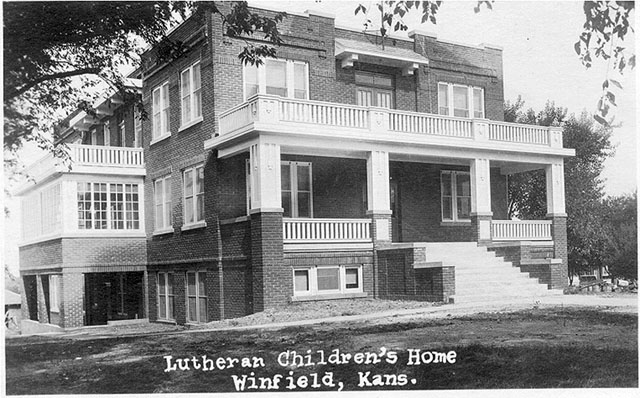
Mrs. Baden, beloved by the hundreds of friends she made among both old and young, always took a particular interest in the educational, church and charitable activities of the community. She and Mrs. Baden founded the Lutheran church congregation in Winfield, the St. John’s College, the orphanage of the Lutheran Children’s Friend Society, and in addition assisted in dozens of other community institutions, including the original board of the present St. Mary’s Hospital.
Mrs. Baden lived quite simply, and since her husband’s death in 1900 had devoted most of her time to her home and garden, to her charitable interests and church. She was especially fond of young people and frequently entertained them as her guests, much to their delight.
The funeral services, in keeping with her request, were short and simple, with no eulogy and no flowers. They were held Thursday at 3 p.m. in Baden Memorial Lutheran church, which Mrs. Baden built and furnished in 1905 as a memorial to her husband. Rev. Werner Kuntz officiated and gave a short sermon, and music was furnished by the St. John’s quartet. Burial was in Union cemetery beside the grave of her husband, with the only service there the reading of the Lord’s Prayer.
In honor of Mrs. Baden, the flag at St. John’s College was at half mast from the time of her death until after the services.
Pallbearers were M. F. Jarvis, Tom Parker, W. V. Hildebran, C. S. Mundinger, A. E. Kunzmann and E. A. Wolfram.
Adelaide Elisabeth Ballein was born in Alexandria, Clark County, Mo., on July 12, 1861. In 1870 she moved to Neosho, Mo., with her parents and was educated in the public schools of that city. She was married to John Peter Baden on Jan. 15, 1878, at Neosho, and that summer the couple moved to Winfield to make their home.
At the time they came to Winfield, Mr. and Mrs. Baden were the only Lutherans in the city. The nearest church was at Independence, and on months with five Sundays they were able to secure the preacher for services, which were held at their home. After the second and third years the group increased to three families, then increased until services had to be held in the schoolhouse, and still later the city council rooms, the warehouse of Baden’s store, the courthouse, and the lecture room of the Baptist church.
The first Lutheran church was built in 1888 by the few members of the congregation, and later the debt was liquidated by Mr. Baden, who always looked toward a better church edi-fice. To fulfill this wish, Mrs. Baden built the present church, which was dedicated in 1906.
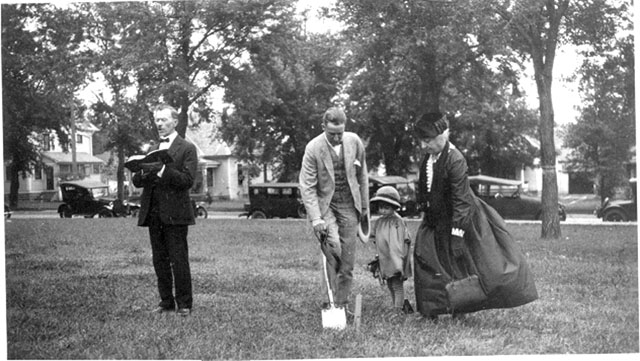
Outstanding in the activities of Mr. and Mrs. Baden, however, was the founding of St. John’s College in 1893, and the building of Baden hall, the first structure on the campus. Since that time they had assisted materially in the development of the school.
Mrs. Baden purchased the block of land which she presented to the Children’s Friend home for an orphanage. She founded the Cowley County Historical Society, of which she was president, and established the historical museum at St. John’s College. She furnished the organ for the Lutheran church, and with other members of the Baden families, gave the organ to St. John’s College.
Another of Mrs. Baden’s interests was her work with the deaf and blind, and each year a highlight of her Christmas season was a Christmas service and party for the deaf. In addition, she assisted many individuals and families with their problems, all in a quiet manner.
In addition to the flowers and trees at her home, Mrs. Baden took great pleasure in cultivating friends of the birds which visited her grounds. Especially in stormy, snowy weather, the birds could be sure they would find a meal at Mrs. Baden’s feeding rack.
Survivors include two sons, Martin W. and Ernest H., of Winfield; a granddaughter, Miss Adelaide Baden; and three brothers: Frank Ballein of Winfield; Henry F. Schurmann of San Antonio, Texas; and W. A. Schurmann of Griffith, Ind. W. A. Schurmann was unable to be here for the services because of the serious illness of his wife.
BADEN’S BANQUET.
The Employees of the Ice Plant and Packing House Feast at the Brettun.
[Source believed to be Winfield Courier/Date Unknown.]
A COURIER representative was called to J. B. Lynn’s store last night at [?] o’clock in response to a phone message announcing an item of news. He went up on double quick time suspecting the store was on fire or some awful crime had been committed. As he crossed Main street at the corner his convictions were confirmed in seeing Policeman Dick Kruger standing in Lynn’s door surrounded by a large crowd of men and boys. On going within however, away from the shade cast by the gas lamp on the corner, the reporter found himself in the midst of a jolly, expectant crowd that represented the working force of the Baden ice plant and packing house.
Martin Baden and Chance Wells were singled out for an explanation. They informed the reporter that something was about to happen: that the Baden ice plant and packing house employees were soon to dine with their employer, Mrs. J. P. Baden, and that they were only waiting for the banquet tables to be spread at the Brettun. This was pleasant news and a good item.
When everything was announced to be in readiness, the force numbering almost one hundred, marched north on Main to the Brettun, where Mrs. E. J. Hines & Son, under the direction of Mrs. Baden, had prepared a feast for the gods.
Mrs. Baden, who New Year’s day sold both the packing house and ice plant to the J. P. Baden Produce company, gave the banquet to her employees as a farewell compliment to the excellent service they had given in years past.
At 9 o’clock the force was ushered into the spacious dining hall and seated. A supper of three courses was served, after which W. A. Smith on behalf of the employees arose and said a few words appropriate to the occasion. He expressed the sentiments of the entire force when he told Mrs. Baden of the high esteem in which she was held and thanked her for the sumptuous repast which they had all enjoyed.
Mrs. Baden responded and told the boys of her appreciation of their services in the past and said she would always remember the Baden boys. She said when she heard the old mill whistle blow New Year’s morning, calling together the boys who had been a part of the institution for the past twenty years, it was with a feeling of sadness that she remembered they were beginning a new year under a new management.
Music was rendered by the colored boys while the banquet was in progress.
[UNDATED ARTICLE FROM COURIER.]
EMPLOYER TO EMPLOYEES.
ED. COURIER—It is said "out of the fullness of the heart the lips runneth over." Such however was not the case last night—words failed to respond, and I now take this means of expressing myself. In severing my business connection with the ice plant and packing house I decided to invite "the boys" to an oyster supper, to be given at the Brettun house, and make a few good-bye remarks.
As I looked into the faces of the eighty men who have stood by me in the manifold responsibilities that have confronted me the past two years and thought how nobly each and everyone did their duty in filling the spheres in which they were placed—my heart filled with pride that it was my privilege to have known and been among them.
Every community has its bread winners and to me they always represent the salt of the earth.
But I do not think that any industry could boast of a more intelligent, generous or industrious force of men than the force Mr. Baden has been blessed with. Last night’s company represented men in the service, from twenty days to twenty years. Next to the founder of the vast industry, the success of the undertaking belongs to the hard work and honest efforts of these men. And while my business relations are now severed, the Baden name will stay with the new firm, and as long as such is the case my best wishes and good will must ever remain. Whatever my future may be "the boys" will always have a warm spot in my heart and if necessary a good word and a helping hand.
For the new firm of the Baden Produce company I asked the continued courtesy and good will of the community. Their policy for the future will be as in the past, honesty and fair dealing. MRS. A. E. BADEN.
MARTIN WILLIAM BADEN.
[NEWSPAPER CLIPPING/SOURCE & DATE UNKNOWN.]
Rites at Winfield Held for Dr. M. W. Baden, 92.
WINFIELD, KAN.—Grave side services for Dr. Martin W. Baden, 92, Kansas petroleum engineer and geologist, were held Wednesday in Union Cemetery. He died Tuesday. Swisher-Taylor Funeral Home had charge.
Born in Independence, Kan., he was brought to Winfield by stagecoach with his parents in 1879, when he was about age 7.
HIS FATHER, John Peter Baden, known as one of the foremost men in the milling industry and one of the leading shippers of game and country produce in the United States, founded St. John’s College here. His mother, Adelaide Elisabeth, built Baden Memorial Lutheran Church in 1906, in memory of her husband who died in 1900.
Dr. Baden formerly was chief geologist and executive vice president of Trees Oil Co. and geologist for Trees-Benedum Oil Co.
He held degrees from St. John’s College and Southwestern College, in Winfield, and a doctorate in science from the University of Pittsburgh, Pa.
The institution honored him for his extensive research in geology and for his success in colorometric determination in chemistry.
HIS GEOLOGICAL work led to drilling the Rainbow Bend, Mahannah, Smith-Shaffer, David and Sherwood oil pools, as well as the Kansas City lime horizon of Hittle oil pool and the Estes-Smithville gas fields.
During World War II, Dr. Baden was chief processing engineer for Boeing Airplane Co., Wichita.
Dr. Baden had to his credit seven important inventions of delicate electrical equipment for use in chemical analysis. He operated his own research laboratory for 40 years. His research included:
ULTRA-VIOLET ray analysis of cuttings and cores from oil wells; means of preventing pipe corrosion; advanced methods of chemical analysis of brines coming from oil wells; development of colorometric photo-electric analyzers; electronic methods used in search for petroleum, and radioactivity methods for doing subsurface geology in petroleum geology.
His wife, Grace Curnett Baden, died in 1964.
During the past two years, Dr. Baden lived with his daughter and son-in-law in Winfield and he continued his scientific work.
Survivors include his daughter, Mrs. Frederick (Adelaide) Barnard, and his grandson, Martin Frederick Barnard.
[NEWS CLIPPING/PAPER AND YEAR UNKNOWN.]
THE DAY AT WINFIELD.
Martin W. Baden’s Marriage to Miss Curnett—A New Cashier—Mention.
Winfield, Kas., Jan. 16.—Martin W. Baden, son of J. P. Baden, the commission man, and Miss Grace Curnett of Chicago were married last night at the home of the bride’s sister, Mrs. J. A. Garrick. They left on the evening train for Kansas City, St. Louis and Chicago, to be gone about two weeks. The groom’s parents presented them with a new home on East Ninth Avenue, where they will begin keeping house.
[NEWS CLIPPING. SOURCE/DATE UNKNOWN.]
Baden-Curnett.
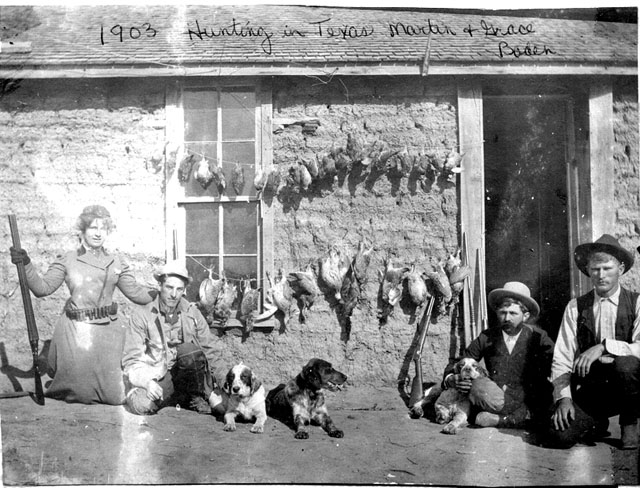
At the residence of the bride’s sister, Mrs. J. A. Garrick, last Monday evening Rev. Steopplewerth united in marriage Martin Baden and Miss Grace M. Curnett. The groom is the eldest son of J. P. Baden, a young man of much promise. The bride formerly lived in Chicago, but for more than a year past has been a resident of Winfield and is a most estimable lady. The young couple will spend a few weeks in the east, after which they will return to this city and make their home in their elegant new residence on east Ninth.
[Underneath this picture someone penned in "1900"]
[NEWS CLIPPING\PAPER AND DATE UNKNOWN.]
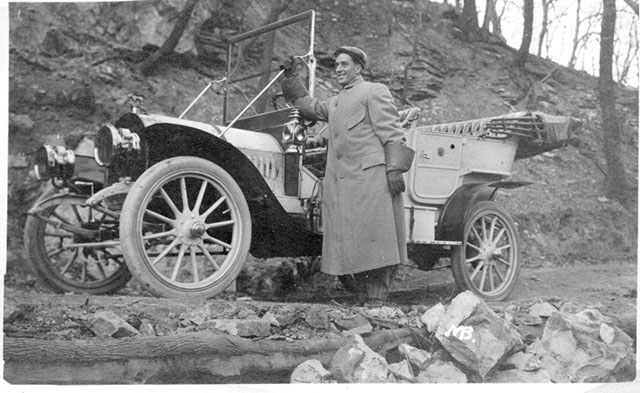
Mr. and Mrs. Martin Baden went to Wichita this afternoon in their new eight-cylinder Cadillac roadster. This car was especially built for Mr. Baden, and is equipped with all modern appliances.
[NEWSPAPER SOURCE/DATE UNKNOWN.]
[Penned in ink: "1964" above article/picture.]
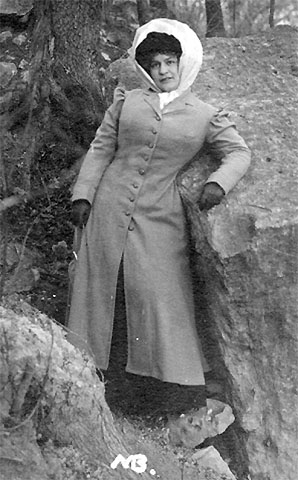
Mrs. Baden Dies Here on Friday.
Grace Curnett Baden, wife of Dr. Martin W. Baden, 1219 E. 9th, died Friday after a long illness.
Funeral services will be held at the Swisher-Taylor chapel Monday at 10 a.m. with burial in Union cemetery. The casket will not be opened at the services. Rev. A. E. Kunzmann will officiate at the services.
Mrs. Baden was born March 3, 1879, at Carrollton, Ill., the daughter of Mr. and Mrs. Anoa Curnett. She was a long-time resident of Chicago, where she was reared by her sister and brother-in-law, Judge and Mrs. J. R. Ward.
She attended boarding schools in the East and came to Winfield on a visit in 1899, where she met and subsequently married Martin William Baden on Jan. 15, 1900.
Mrs. Baden was a former member of Philharmonic Music club, and was recognized for her fine soprano voice. She was also a former member of Study club and Winfield Music club. In 1906 she was elected by popular vote as the most beautiful girl in Winfield and reigned as queen in a flower pageant.
A member of Trinity Lutheran church, she is survived by her husband; a daughter, Mrs. Frederick J. (Adelaide) Barnard; and a grandson, Martin Frederick Barnard.
[NEWSPAPER CLIPPING/SOURCE & DATE NOT KNOWN.]
Special to The Eagle.
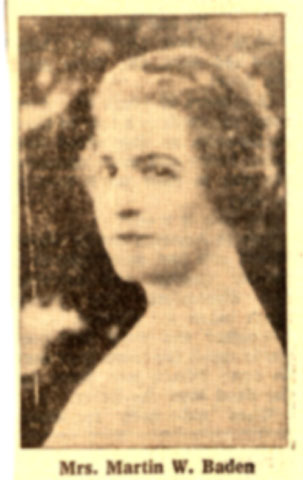
WINFIELD, KAN.—Services for Mrs. Grace Curnett Baden, 85, Winfield, who died Friday, will be at 10 a.m. Monday at Swisher-Taylor Chapel, with burial in Union Cemetery.
She was a native of Illinois and first came to Winfield in 1899. She was selected the most beautiful in Winfield in 1906 and reigned as Flower Pageant Queen.
Survivors include the widower, Dr. Martin W., and a daughter, Mrs. Frederick J. Barnard.
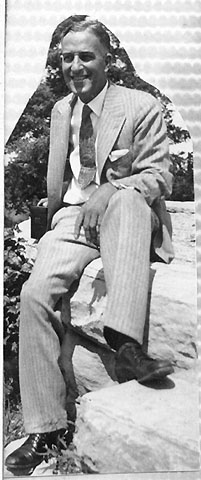
[SOURCE/DATE NOT KNOWN.]
BADEN PROMINENTLY IDENTIFIED WITH OIL
Winfield Man Recognized As Able Geologist, Engineer.
Dr. Martin W. Baden, prominent Winfield citizen and consulting geologist, has been actively engaged in the oil business in this area for more than 27 years. Operating from the same office in the Baden building throughout that period, Mr. Baden has been connected with most of the important developments of Cowley County’s oil history.
Awarded the Doctor of Science degree from Pittsburgh University for his contributions to the oil industry, Mr. Baden has done considerable research in the scientific aspects of the producing and pipe line divisions of the oil industry and has secured a number of patents on the developments of his research. He served for ten years as vice-president and general manager of the Trees Oil company and was associated with the Cities Service Oil company for one year.
Did Geology on Many Pools.
Mr. Baden’s contribution to the Cowley County oil industry can be better realized when it is known that he worked out the geology that led to the drilling of the discovery wells of the Rainbow Bend oil pool, the Mahanna oil pool, the Smith-Shaffer oil pool, the Sherwood oil pool and the Estes and Smithville gas fields.
Active in city government as well as in oil affairs, Mr. Baden is now serving as president of the Winfield board of education. His hobbies are photography, sound-on-film and amateur motion pictures, on each of which he spends much time in research in his home laboratory.
HELIUM IN KANSAS FIELDS
STATE’S GAS HAS RICHEST CONTENT OF ELEMENT OF ANY.
First of Non-Inflammable Product Was Found at Augusta, but Its Value
Was Not Known—Dexter Field Leads Now.
THE KANSAS CITY STAR, SUNDAY, APRIL 2, 1922.
Winfield, Kas., April 1.—Kansas, which once thrilled the world of petroleum with the discovery of imperial crude oil riches, may yet startle the chemical and aeronautical circles of science by its supply of the new marvel gas, helium.
Kansas has the richest gas field in helium content so far found in the world, according to M. W. Baden of Winfield, one of the best known geologists in the state.
The first helium gas bearing the high content to be found in the state was at Augusta several years ago. This gas was found at a depth of five hundred feet. It was worthless at that time. No effort was made to conserve it, or to prolong the life of the producing area. The field is exhausted.
Natural gas bearing the largest helium content of any field in the world at the present time is at Dexter, Cowley County, it is said by Baden. The first well was drilled there in 1903. The gas was sent to the University of Kansas for analysis, which was made by Hamilton P. Cady and David D. McFarland. It disclosed a helium content. After the analysis Professor Cady obtained samples from all Kansas fields. The Dexter sample contained a greater percentage of helium than any other sample obtained in the state. Recent investiga-tion, according to Baden, and an analysis of gas fields all over the United States shows the Dexter field to contain the largest helium content of any field in the world.
"Most of the helium bearing gas fields of Kansas have a greater helium content than the Petrolia field," Baden says. "Since the Augusta shallow sand gas field has been exhausted, the Dexter deep sand probably contains a higher percentage than any other gas field in the world. The Eldorado gas field has a sand that was found at 900 to 1,200 feet, carrying about 1.25 per cent helium.
"The gases found in the Dexter field contain nitrogen content of more than 82 per cent. Nitrogen gas, being a non-reactive gas, will not burn under ordinary conditions. This large production of nitrogen found in the Dexter field makes it possible for future use as a fertilizer.
"Prof. A. C. Duncan of the University of Kansas has found that the Dexter gas, with its rich nitrogen content, will yield cyanamis (CaCn2) when passed over calcium carbide (CaC2) at a high temperature."
[PENNED "KANSAS CITY STAR"/(Copyright, 1934.)]
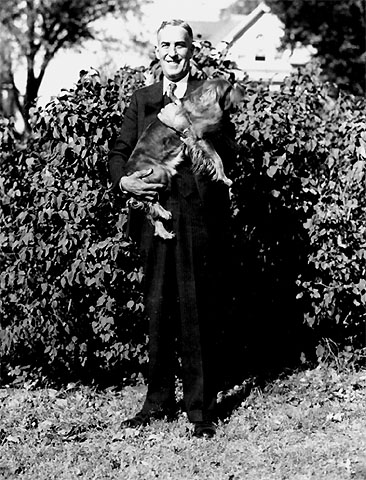
Meet Some of Our Neighbors.
Martin Baden, Winfield’s Oil Country Scientist and Inventor, Is a Home Town Boy Who made Good at Home, a Boiler-Room Apprentice Who Rose to Engineering Heights.
(By a Member of The Star’s Staff.)
WINFIELD, KAS., Oct. 6.—Martin Baden is the town rich man’s son who put on overalls and went to work in his father’s ice plant instead of going away for a good education. Local business men used to say "Mart" Baden was a good practical young fellow in spite of playing the guitar and making the county fair circuit as a bicycle rider.
Today Martin Baden holds an honorary doctor of science degree from the University of Pittsburgh and membership in a long list of national societies which indicate he is recognized as a mechanical engineer, a petroleum geologist, an electrical engineer, a chemist, and a mining and metallurgical engineer. He is a lecturer in petroleum geology at Southwestern college, Winfield, and has to his credit seven important inventions of delicate electrical equipment for use in chemical analyses. He was nearly 50 years old when he took his A. B. Degree from Southwestern college.
All of which can meet the approval of the most practical of business men. He wasn’t after honors or knowledge for the sake of knowledge. He did his studying in the various sciences related to the oil industry because he was making leases. He brought in two important oil pools in Cowley County and one in Sumner County, and was one of the men interested in the first big strike of the El Dorado pool. He has been active in the petroleum industry throughout the country.
A Puzzle to His Home Town.
Around Winfield a lot of people have had difficulty knowing where to place him. They say he is smart enough but that he has a way of throwing things at favorite local enterprises. They say it just doesn’t seem consistent in a home town boy, the son of old J. P. Baden, who owned the mill, the big general merchandise store and the ice and cold storage plant.
Martin Baden in his barn of an office is certainly inconsistent. The office looks like a storeroom for badly worn scientific books; but the man who rises to greet his guest looks like a club man, possibly a polo player. His smile is friendly and moderately skeptical. Slender and taller than the average, he wears his immaculate, conservatively sporty clothes with an easy air. The first hint of gray is in his hair, and he looks twenty years younger than his age, which is nearly 56. He adds to the inconsistency when the talk gets around to fundamental social questions. An inventor, he thinks there ought to be a federal regulation of inventions.
"We can’t let inventors get too far ahead of social progress," he says. "Every time an inventor thinks of a labor saving device, it throws a few or many thousand men out of work. I believe in labor saving inventions; but we ought to have a cabinet member who would permit their use only after he could see the way to absorbing the additional unemployed."
His skepticism is of the kind that simply withholds judgments. When he gives his approval to a person or idea, he gives it all.
He Likes Modern Education.
As a teacher he says, "The high school graduates today are better equipped than the college graduates of thirty years ago. As for the modern universities, they are turning out an amazing number of experts every year. Nobody can be in the exclusive class any more."
About fifty-five years ago J. P. Baden moved his family from Independence, Kas., to Winfield, traveling in a stage with surveyors who were laying out the route for the Santa Fe railroad from Independence to Wellington. He opened the typical general merchandise store where he sold everything from plows to prairie chickens, and from calico to bucket candy. He built a mill on Walnut River and later added the ice and cold storage plant. He founded the St. John’s Lutheran college of Winfield, lived in a nice home with big trees and drove fine horses.
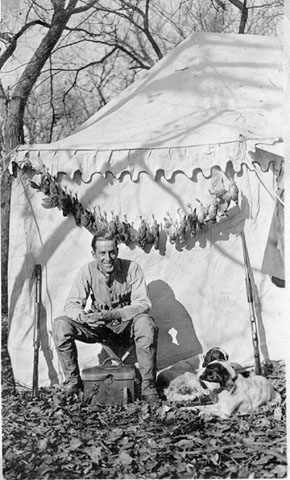
Martin, the elder of his two sons, from the beginning had a flair for building things and experimenting. He set up his electrical and mechanical library in the barn. When he wasn’t working there he hunted and fished along the banks of Walnut River. He was considered by the other boys more or less an authority on bird dogs and usually had four or five of them around the house. In the Lutheran parochial school he was just a fair student.
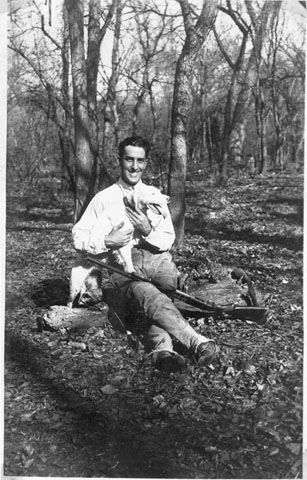
In fact, as he remembers it now, he was about the average in everything he did outside the laboratory. He liked to read everything he could get his hands on; and now he looks b ack a little wistfully on the lost art of general reading. He says he hasn’t read anything but scientific books for thirty-five years.
Science and Baseball in College.
He went through high school at the St. John’s academy and the two years of junior college work that were offered. He specialized in the sciences and baseball. A picture of the St. John’s baseball team still hangs in his office. The available scientific work offered in the new school was only enough to whet his curiosity.
Being just as curious about the machinery down at the ice plant, he went to work as soon as he finished the two years of junior college. Starting as an apprentice in the engine room, he had become foreman by the time the plant was sold in 1901. When he went to work he practically gave up everything else. He fired boilers on his first job, working the undesirable shift from midnight to noon. Soon afterward he took an extension course in electricity for the immediate purpose of wiring the cold storage plant for electric power and installing the motors.
About the same time he made an X-ray machine. In the old files of a local paper is a story about his machine locating a broken needle in a young woman’s hand, an incident that occurred more than thirty years ago.
When the ice plant was sold, Martin Baden went into a small electrical business of his own. People in Winfield were surprised at the son of J. P. Baden tinkering around with such an unimportant enterprise; but he was never much concerned with living up to a name. Socially he was a good companion who was a little prone to send in last-minute excuses on dinner engagements. He looked well and dressed well.
Oil Field Debut Costly.
By 1910 oil had become the talk of Southern Kansas and Martin Baden started making leases and losing money. That gave him the idea of taking an extension course in geology, his entrance into the science of the oil industry. It wasn’t long until he started bringing in oil wells.
As an oil man he discovered the need for chemistry and took up the additional study. His well equipped laboratory occupied two other chemists full time. Among his various inven-tions for use in making chemical analyses was a photo-electric apparatus using the electric eye to ascertain the density of colors.
In 1923, after activity in many branches of the oil business, he became chief geologist and executive vice-president of the Trees Oil Company and geologist for the Benedum-Trees Oil Company of Pittsburgh, Pa. Recently he has become a consulting petroleum engineer. For many years his work has taken him regularly into every oil production state in the country and about six times a year to business conferences in the East.
It was in 1926 when he was an established business man, geologist, chemist and petroleum engineer, that he enrolled for regular classes at Southwestern college, along with boys and girls in their teens. He took his A. B. Degree in 1929. The honorary doctor’s degree from the University of Pittsburgh came the following year.
Around Winfield people will tell you Martin Baden’s greatest weakness is talking pictures. At the start he built his own sound synchronizing equipment.
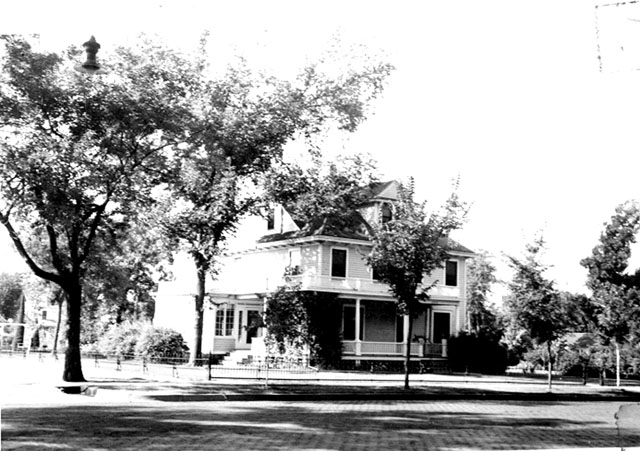
Like his father before him he lives in a big house with shade trees, but it is hard to see how he could ever settle down to the enjoyment of a front porch. He is always tinkering with things or ideas. R. B. F.
[SOURCE/DATE UNKNOWN.]
Dr. Martin Baden Listed In International Blue Book.
Dr. Martin W. Baden of Winfield appears in the "International Blue Book of World Notables, 1951-52," which was issued last week. It is described by the publishers, Chancery House in New York, as "A biographical dictionary of the world’s notable living men and women." His name also appears in the 1952 edition of "Who’s Who in Science."
Dr. Baden was asked for permission to include his name in the publication three years ago, but had forgotten it, so was pleasantly surprised when he received a copy last week.
His biography is listed as follows in the book: "Baden, Martin W., Sc. D., Petroleum geologist. Has operated his research laboratory for the past 30 years. Research work: Ultra-violet ray analysis of cuttings and cores from oil wells; advanced methods of chemical analysis of brines coming from oil wells; means of preventing corrosion in pipe; developed colorometric photoelectric analyzer; electronic methods used in search for petroleum; radio activity methods for doing subsurface geology in petroleum geology. Author of many articles for oil magazines. Chief processing engineer at Boeing Airplane Co., Wichita, Kansas, during World War II. Office, First National Bank building, Winfield, Kansas."
The "International Blue Book" is a biographical reference work of international scope, and the present edition is published in English, French, German, Spanish, Portuguese and Italian. Earlier editions, dating back to 1910, are found in all the leading public, professional, university and club libraries of the world.
In the preface, the editors say: "It is no easy task for the editor of such a book to please everybody in determining who is, and who is not, a world celebrity. However, there can be no serious dispute concerning the eligibility of those who appear in the book; and we hope in future editions to increase the size of ‘International Blue Book’ so that many other worthy persons may have a place in its pages."
[WINFIELD DAILY COURIER, MONDAY, OCTOBER /Penned in: 1956]
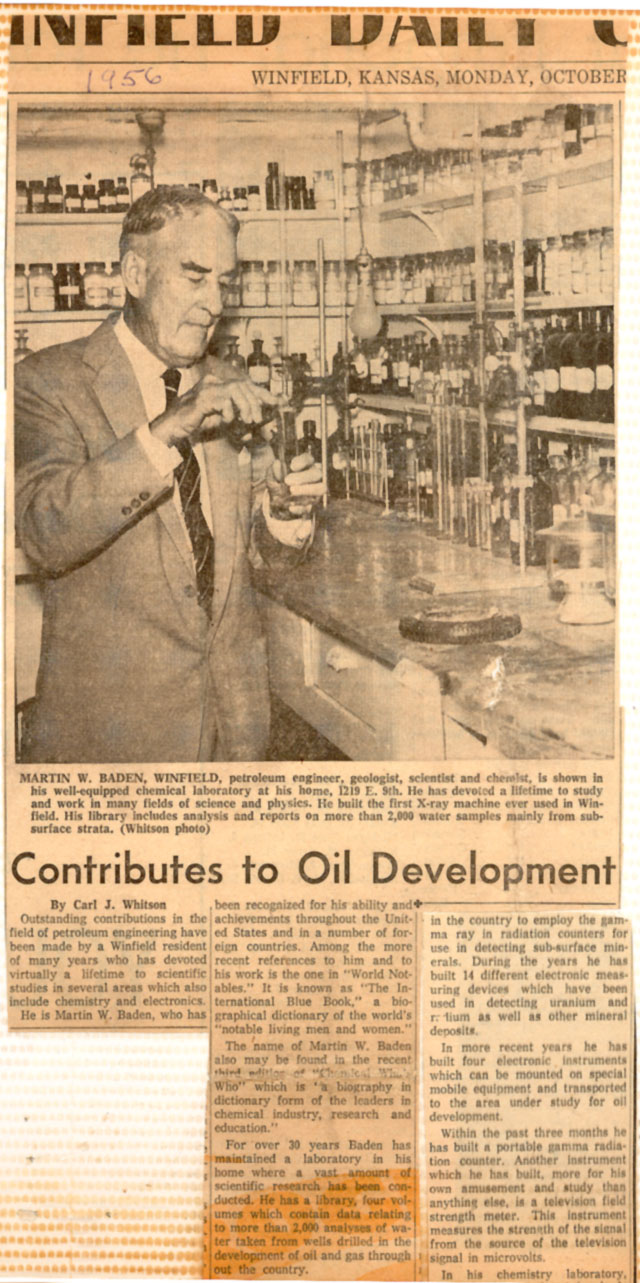
[PICTURE OF MARTIN W. BADEN AT TOP OF ARTICLE.]
MARTIN W. BADEN, WINFIELD, petroleum engineer, geologist, scientist and chemist, is shown in his well-equipped chemical laboratory at his home, 1219 E. 9th. He has devoted a lifetime to study and work in many fields of science and physics. He built the first X-ray machine ever used in Winfield. His library includes analysis and reports on more than 2,000 water samples mainly from subsurface strata. (Whitson photo)
Contributes to Oil Development.
By Carl J. Whitson
Outstanding contributions in the field of petroleum engineering have been made by a Winfield resident of many years who has devoted virtually a lifetime to scientific studies in several areas which also include chemistry and electronics.
He is Martin W. Baden, who has been recognized for his ability and achievements throughout the United States and in a number of foreign countries. Among the more recent references to him and to his work is the one in "World Notables." It is known as "The International Blue Book," a biographical dictionary of the world’s "notable living men and women."
The name of Martin W. Baden also may be found in the recent third edition of "Chemical Who’s Who," which is "a biography in dictionary form of the leaders in chemical industry, research and education."
For over 30 years Baden has maintained a laboratory in his home where a vast amount of scientific research has been conducted. He has a library, four volumes which contain data relating to more than 2,000 analyses of water taken from wells drilled in the development of oil and gas throughout the country.
From these analyses and other research work he was able to make valuable contributions to the oil and gas industry. The research has included ultra-violet ray analysis of cuttings and cores from oil wells; advanced methods of chemical analysis of brines coming from oil wells and means of preventing corrosion in pipe.
Baden developed and patented the colorometric photoelectric analyzer, devised electronic methods for use in search of petroleum, and developed radio activity methods for doing subsurface geology.
He was one of the first scientists in the country to employ the gamma ray in radiation counters for use in detecting subsurface minerals. During the years he has built 14 different electronic measuring devices which have been used in detecting uranium and radium as well as other mineral deposits.
In more recent years he has built four electronic instruments which can be mounted on special mobile equipment and transported to the area under study for oil development.
Within the past three months he has built a portable gamma radiation counter. Another instrument which he has built, more for his own amusement and study than anything else, is a television field strength meter. This instrument measures the strength of the signal from the source of the television signal in microvolts.
In his chemical laboratory, where he has analyzed hundreds of water samples, Baden has employed extensively the use of the photo-electric colorimeter, which reads the color, change, and densities of fluids. The patent on this invention was sold to the American Instrument Co., of Silver Springs, Md.
Invents Solar Unit.
Another invention used in his laboratory is a solar evaporating unit. This also is used in the analysis of fluids. The patent on this equipment was sold to the Precision Scientific Co., Chicago. This equipment has proved itself to be particularly valuable in chemical labora-tories because there is virtually no loss of chemical elements by evaporation when liquids are heated.
Baden built the first X-ray machine ever to be put in use in Winfield. The first doctors to use it were the late Doctors Emerson, Jacobus and Holcomb. The first time it was used was to locate a bullet lodged in the victim of a shooting affray.
The X-ray tube used in the construction of the unit was imported from Germany.
This old machine is still in the Baden home. Baden plans to make a gift of it to the Cowley County Historical society.
Prepares Reports.
In the area of geology Baden has prepared voluminous reports on a number of large oil and gas fields for use by investment bankers in making loans to large oil companies.
One such preliminary geological and engineering report covered properties owned by The Kay County Gas Co., of Ponca City. Another covered gas properties of the Texas-Louisiana Power Co. Properties near Gainesville and was for the General Management Corporation (E. H. Rollins Co., of New York City.)
A similar report was made for the American Equities Corp., New York City, on the properties of Kuntz-Hulze, Inc., Cleveland, Ohio.
A comprehensive and detailed report on the subject of water analysis in the Big Lake oil field in Reagan County, Texas, was made for the Big Lake Oil Co.
During World War II Baden was chief materials processing engineer for the Boeing Aircraft plant in Wichita.
Serves Oil Firms.
Through the years he has been consulting geologist for numerous oil firms including Benedum-Trees, Marland (now Continental), Kan-O-Tex (now Anderson-Prichard), and Consolidated Gas Utilities corporation.
In addition to work in the field and in the laboratory, Baden somehow found time to write numerous articles on various scientific subjects for magazines and journals, and to be a college instructor. In 1934-35 he was a lecturer at Southwestern college in a course of applied petroleum geology for juniors and seniors at the time when the late R. B. Dunlevy was recognized as an authority in the field of chemistry and geology.
Member of Societies.
During his lifetime, Martin W. Baden has held memberships in Registered Professional Engineers in Mining, State of Kansas; American Society of Mechanical Engineers, American Society for Petroleum Geologists, American Institute of Electrical Engineers, American Institute of Mining and Metallur-
[REST OF ARTICLE MISSING.]
[NEWSPAPER CLIPPING/SOURCE & DATE UNKNOWN.]
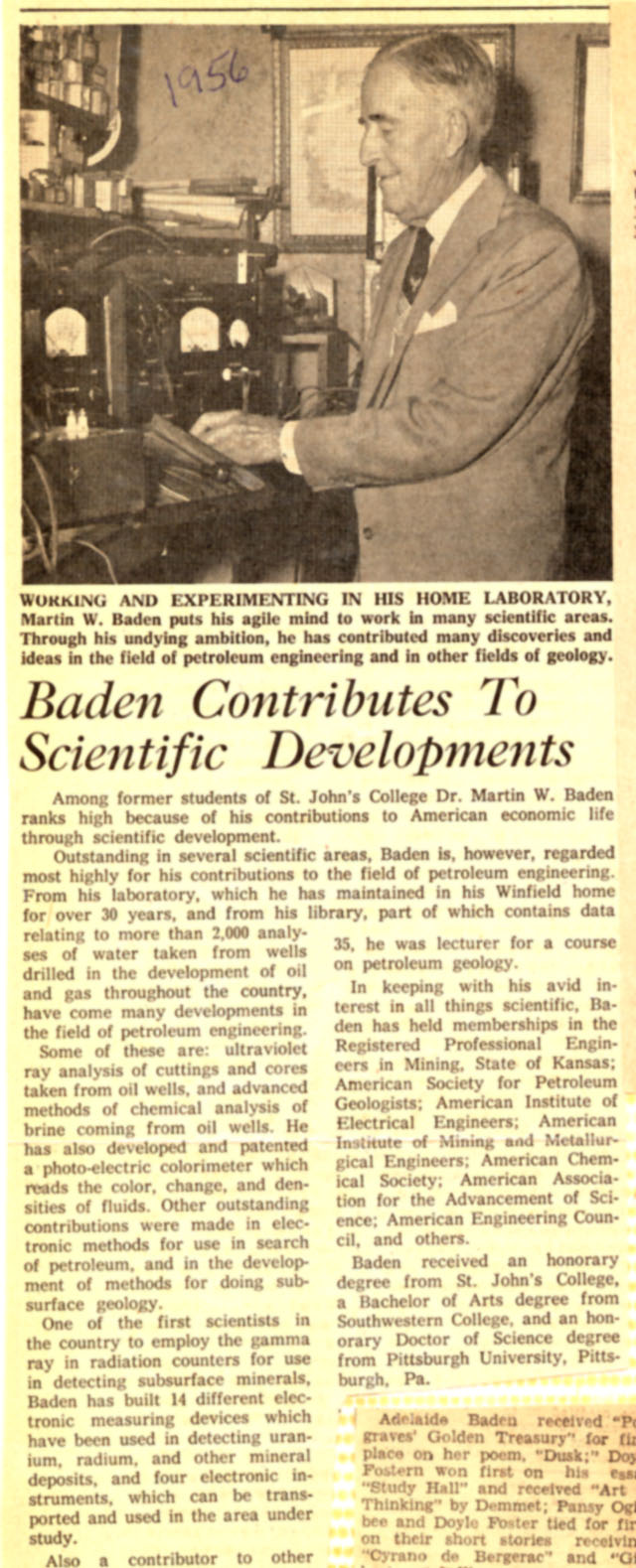
[PICTURE WITH CAPTION.]
Note: "1956" penned in on the picture.
WORKING AND EXPERIMENTING IN HIS HOME LABORATORY, Martin W. Baden puts his agile mind to work in many scientific areas. Through his undying ambition, he has contributed many discoveries and ideas in the field of petroleum engineering and in other fields of geology.
Baden Contributes To Scientific Developments.
Among former students of St. John’s College Dr. Martin W. Baden ranks high because of his contributions to American economic life through scientific development.
Outstanding in several scientific areas, Baden is, however, regarded most highly for his contributions to the field of petroleum engineering. From his laboratory, which he has maintained in his Winfield home for over 30 years, and from his library, part of which contains data relating to more than 2,000 analyses of water taken from wells drilled in the development of oil and gas throughout the country, have come many developments in the field of petroleum engineering.
Some of these are: ultraviolet ray analysis of cuttings and cores taken from oil wells, and advanced methods of chemical analysis of brine coming from oil wells. He has also developed and patented a photo-electric colorimeter which reads the color, change, and densities of fluids. Other outstanding contributions were made in electronic methods for use in search of petroleum, and in the development of methods for doing subsurface geology.
One of the first scientists in the country to employ the gamma ray in radiation counters for use in detecting subsurface minerals, Baden has built 14 different electronic measuring devices which have been used in detecting uranium, radium, and other mineral deposits, and four electronic instruments, which can be transported and used in the area under study.
Also a contributor to other scientific fields, Martin Baden has invented and patented a solar evaporating unit, developed a television field strength meter, and built the first X-ray machine ever used in Winfield.
In various kindnesses and gifts Mr. Baden has throughout a long series of years demonstrated his interest in the college which was founded by his parents. The flag pole on the college campus is one of his gifts, as are also a loud speaking system built by him and presented to the speech department, and a Geiger-Mueller counter recently built and presented to the science department. At various times he has sponsored athletic and speech activities at the college.
Although all this kept him busy, nevertheless Baden has found time to prepare numerous reports and analyses on a number of large oil and gas fields for use by investment bankers in making loans, and for use by large oil companies; and to serve as chief materials process-ing engineer for Boeing Aircraft in Wichita during World War II; to be consulting geologist for numerous oil firms; to write many articles on various scientific subjects for magazines and journals; and to instruct at Southwestern College, where during the school year 1934-35, he was lecturer for a course on petroleum geology.
In keeping with his avid interest in all things scientific, Baden has held memberships in the Registered Professional Engineers in Mining, State of Kansas; American Institute of Mining and Metallurgical Engineers; American Chemical Society; American Association for the Advancement of Science; American Engineering Council, and others.
Baden received an honorary degree from St. John’s College, a Bachelor of Arts degree from Southwestern College, and an honorary Doctor of Science degree from Pittsburgh University, Pittsburgh, Pa.
[NEWSPAPER CLIPPING/SOURCE & DATE UNKNOWN.]
[Penned in above article, "Sept. 21, 1971."]
[Article contains photo of Dr. Martin W. Baden.]
Dr. Martin W. Baden, Winfield Pioneer, Dies.
Private Grave side services were held today at Union Cemetery for Dr. Martin William Baden, who died Tuesday. The Rev. A. E. Kunzmann officiated.
Born in Independence, Nov. 25, 1878, he was brought to Winfield by stage coach in 1879 by his parents, John Peter and Adelaide Elisabeth Baden. His father, J. P. Baden, one of the foremost men in the milling and farm produce businesses, founded St. John’s College here. In 1906, his mother built Baden Memorial Lutheran Church in memory of her husband who died in 1900.
Dr. Baden was formerly chief geologist and executive vice president of the Trees Oil Co., and geologist for the Benedum-Trees Oil Co. He held degrees from St. John’s and South-western Colleges and was awarded the doctor of science degree from the University of Pitts-burgh, Pa. He was many times listed in "Who’s Who in America," and in many scientific publications.
Baden, who invented seven different items of electrical equipment for use in chemical analysis, also was consulting engineer for numerous oil firms, wrote articles for various scientific journals, and in 1934-35 was lecturer at Southwestern College in applied petroleum geology.
He attended the Lutheran Church, was a former member of the park board, a past presi-dent of the Winfield Board of Education and a former member of the Masonic Lodge.
His wife, Grace Curnett Baden, preceded him in death in 1964. He was also preceded in death by his brother, Ernest.
During the past two years he lived with his daughter and son-in-law, Mr. and Mrs. Frederick J. (Adelaide Elisabeth) Barnard, who survive. He is also survived by his grandson, Martin Frederick Barnard, a freshman at Southwestern College.
ADELAIDE BADEN.
Birth Announcement:
Adelaide Elisabeth Baden
October thirty-first
Nineteen hundred and nineteen
Mr. and Mrs. Martin William Baden
1219 East Ninth Avenue
Clipping from newspaper [source/date not given]:
Given Name of Adelaide Elisabeth.
The little girl who came to gladden the hearts of Mr. and Mrs. Martin Baden, has been given the name, Adelaide Elisabeth, after three generations of grandmothers: Adelaide Meyer, the great, great grandmother; Elisabeth Schurmann, the great grandmother, Adelaide Elisabeth Baden, the grandmother.
[NEWSPAPER CLIPPING. SOURCE/DATE UNKNOWN.]
FOURTH OF JULY PARADE.
Little Folks Stage A Performance Creating Great Delight.
A Fourth of July parade which formed in the neighborhood of the 1300 block on East Ninth Avenue and marched clear to Main Street attracted a good deal of attention and brought a good deal of enjoyment to the little participants, on the nation’s birthday. There were twenty children in line and the parents and interested friends followed on the sidewalk and in automobiles. The parade was headed by a drummer boy (Gilbert Brundy) and con-tained such notable characters as Uncle Sam (Wallace Hilfinger) and the Goddess of Liberty (Lucy Edna Trees). Little Adelaide Baden, the youngest child in the parade, rode in a decorated flat drawn by two tiny girls. Others rode on their bicycles and in wagons but most of them marched. Much of the credit for the success of the affair is due to Dr. and Mrs. F. M. Wilmer, who had seen such parades in St. Joseph, Mo., and to Mrs. R. M. Hilfinger and Miss Ida Jacobus, who did a great deal of decorating of the floats. It is planned to make the parade an annual event.
After the parade refreshments were served to the children by Dr. and Mrs. Wilmer on their lawn.
Those who took part in the parade were Homer Miskimins of Newark, Ohio, Joyce and Gilbert Bundy, Lucy Edna, Paul and Donald Trees, Melba Backus, Howard and Charles Lathrop, Joe Morris, Dorothy Snyder, James Leucke, Jack Savage, Adelaide Baden, Morrill and Josephine Wilmer, John McGregor, Harold Jones and Dean and Wallace Hilfinger.
[NEWS CLIPPING/SOURCE & DATE UNKNOWN.]
Adelaide Baden received "Polgraves’ Golden Treasury" for first place on her poem, "Dusk"; Doyle Foster won first on his essay "Study Hall" and received "Art of Thinking" by Demmet; Pansy Ogilbee and Doyle Foster tied for first on their short stories receiving "Cyrano de Bergerac" and "Gilbert and Sullivan Operas."
[NEWSPAPER CLIPPING/ SOURCE & DATE UNKNOWN.]
BADEN-BARNARD
Adelaide Baden of Winfield and Capt. Frederick J. Barnard of Ann Arbor, Michigan, were united in marriage August 21 in the Strother Air Field chapel near Winfield. Chaplain Donald E. Wineinger read the vows for the ceremony in the presence of the immediate family and a few close friends.
Mrs. Barnard is a graduate of Southwestern, class of 1940. She also attended the Cincinnati Conservatory of Music. She is a talented harpist. For several months she has been employed at Strother field.
Captain Barnard, a graduate of the Michigan State Normal at Ypsilanti, Michigan, is the officer in charge of the instrument flying department at SAAF.

